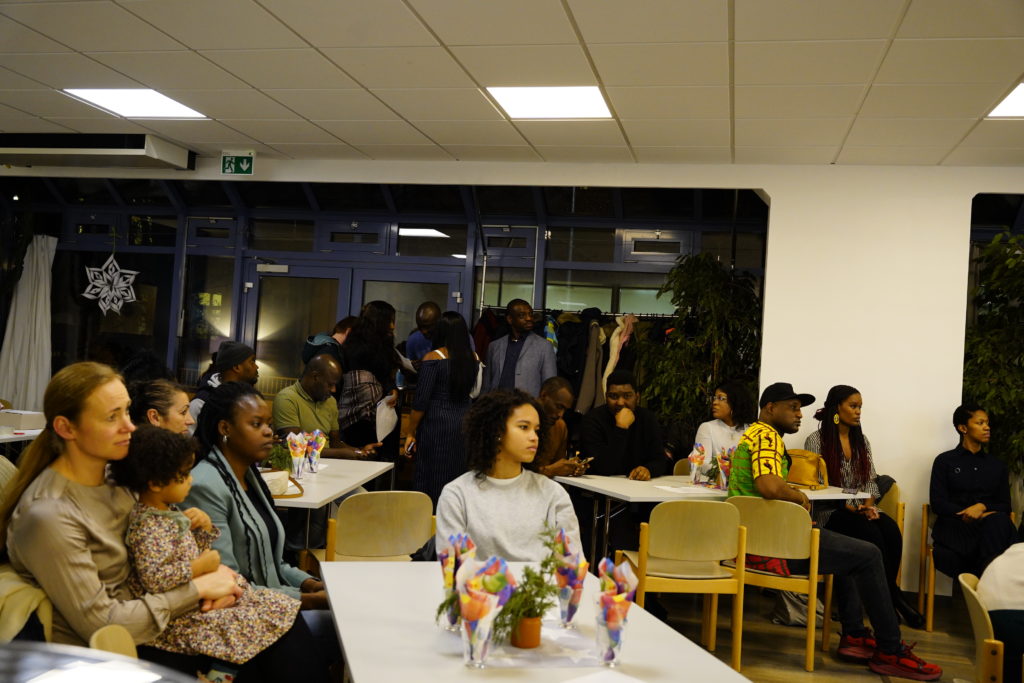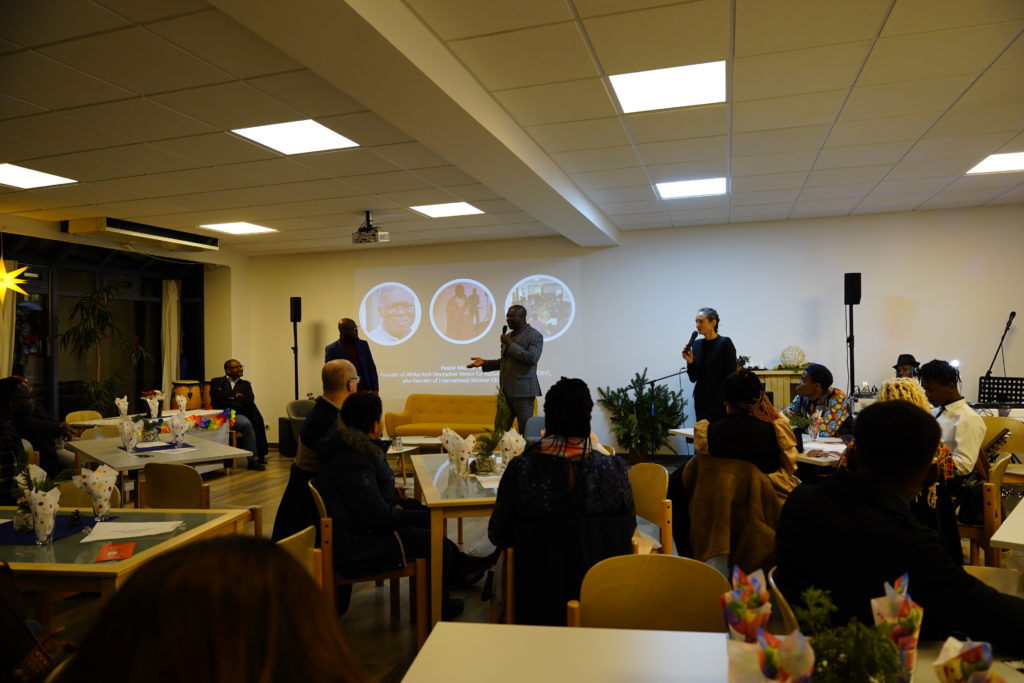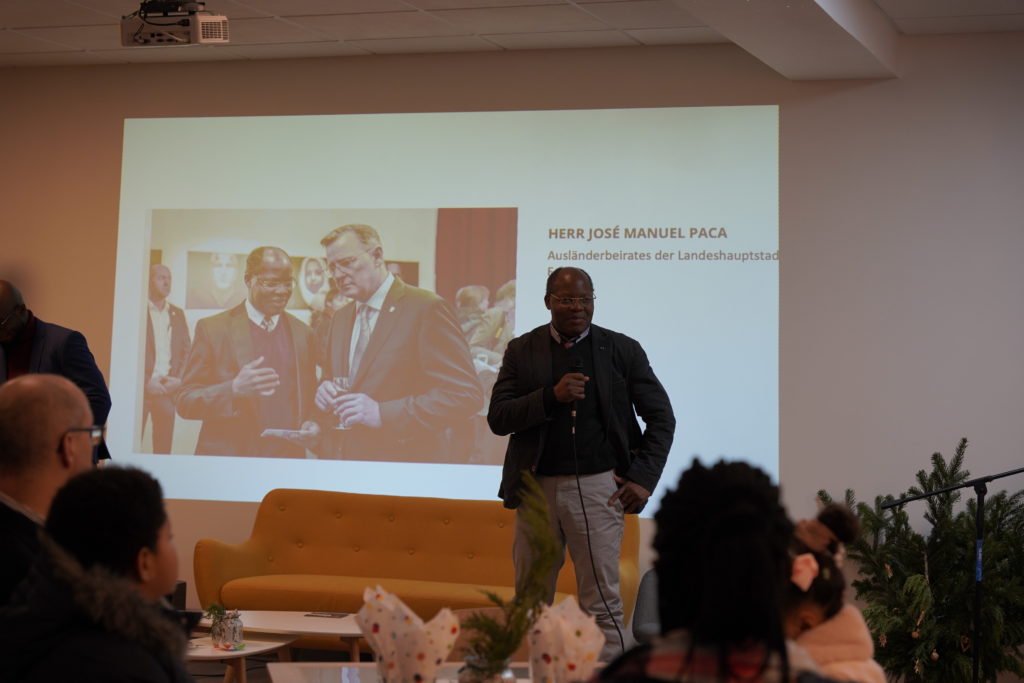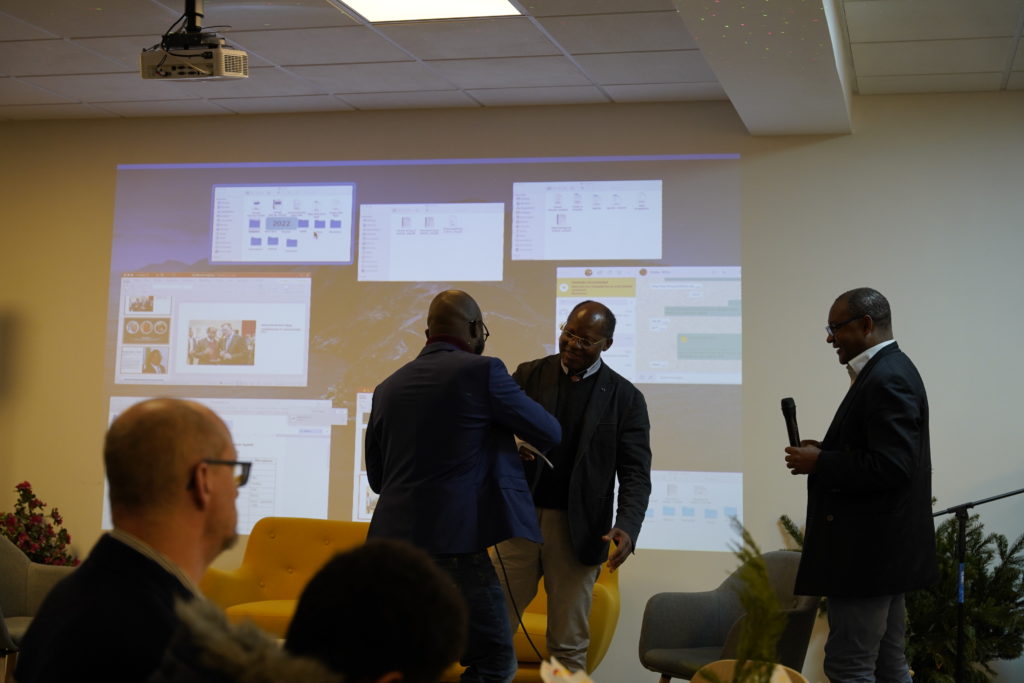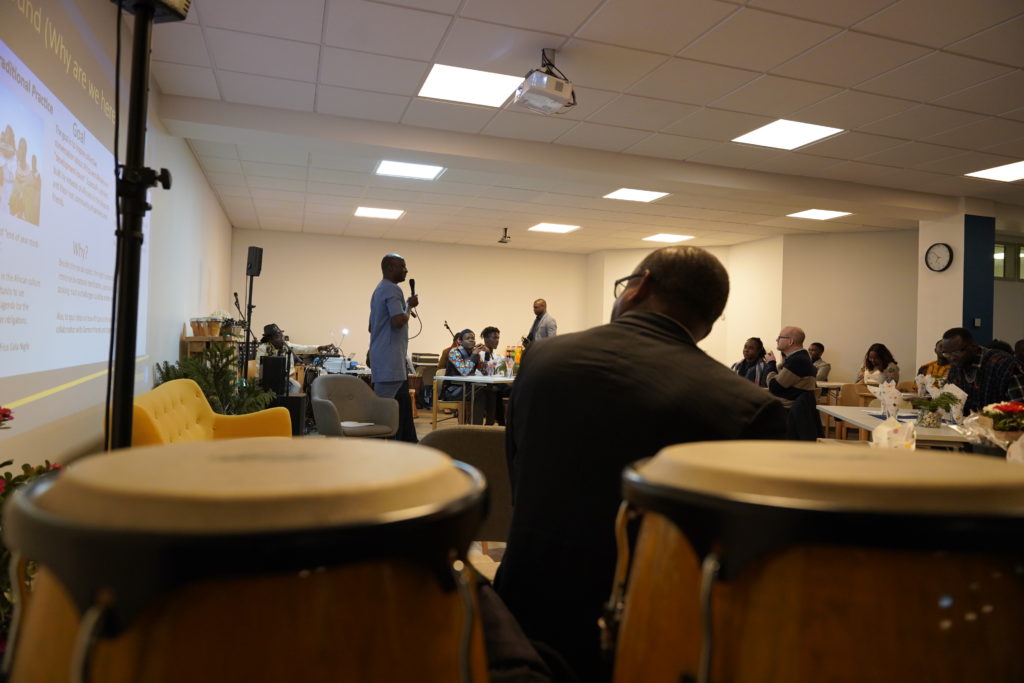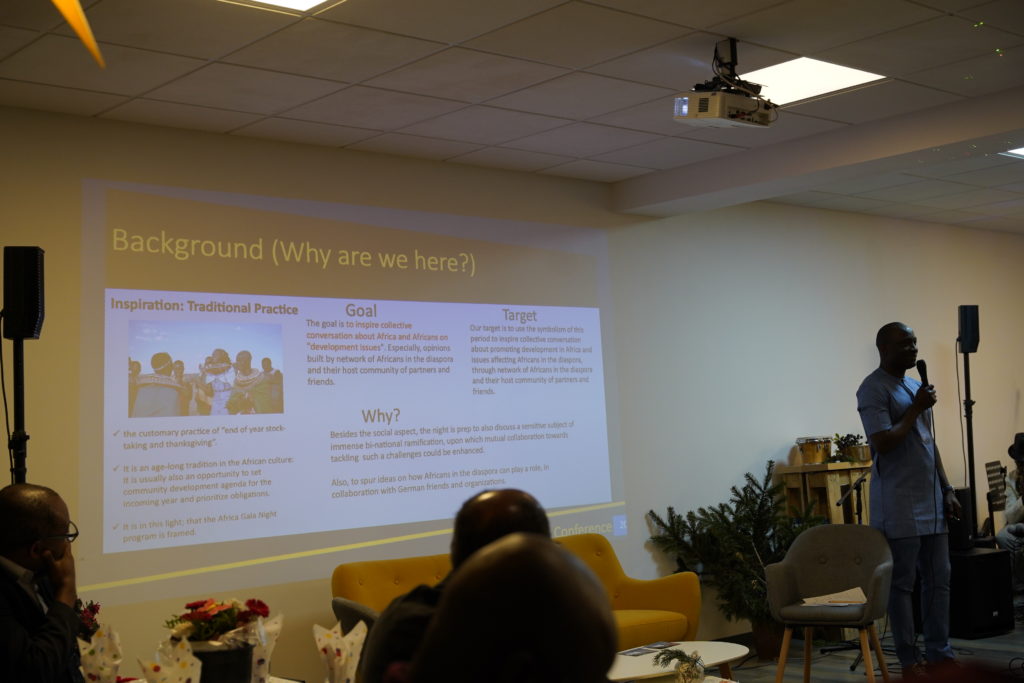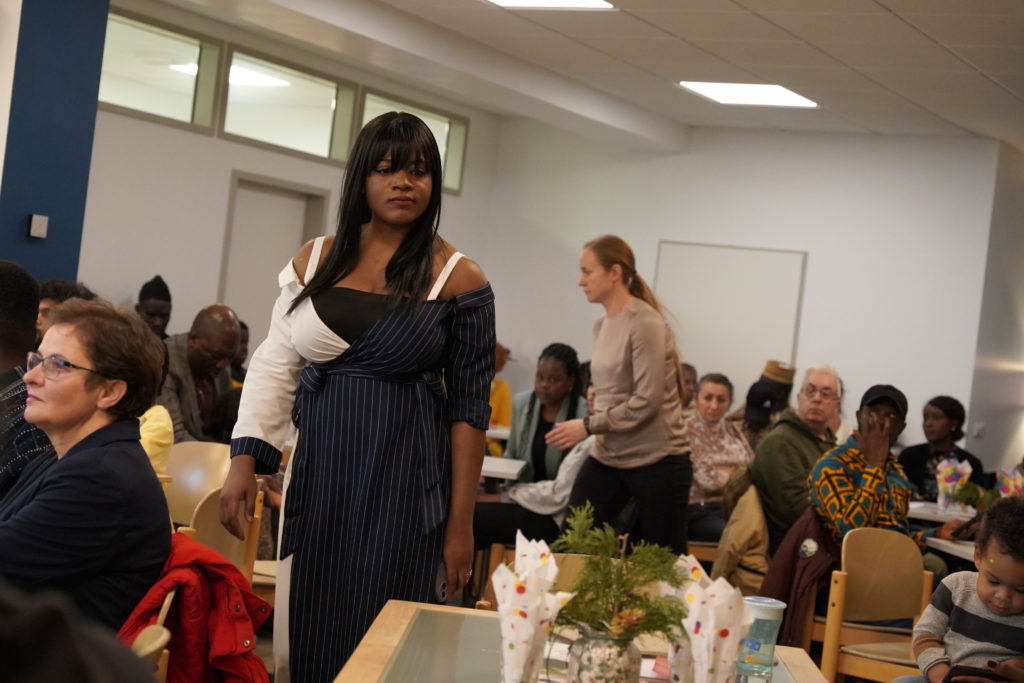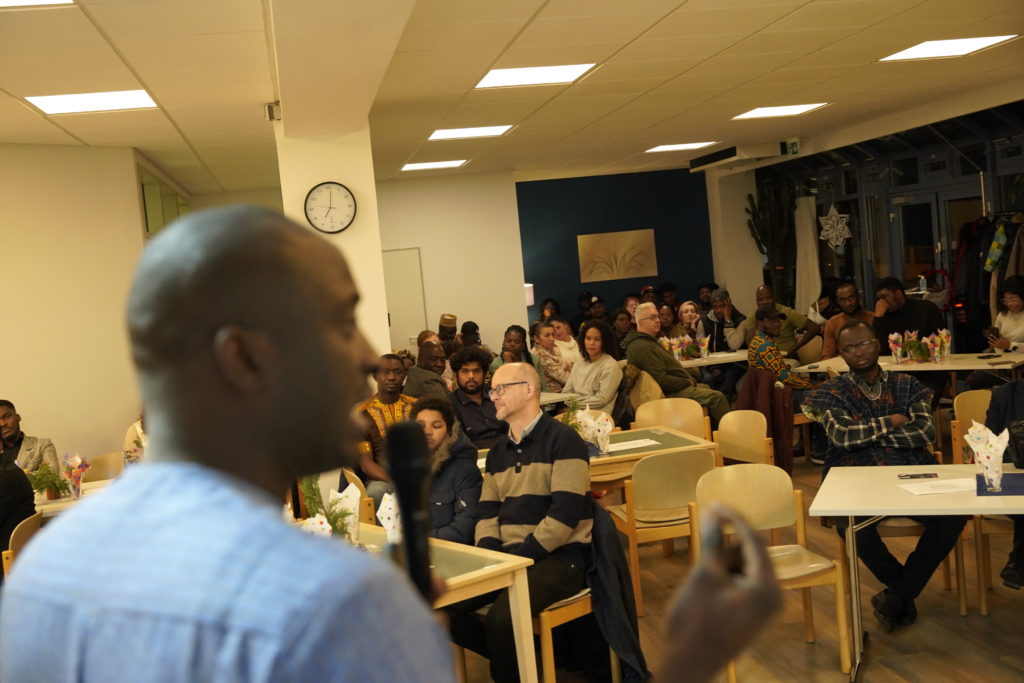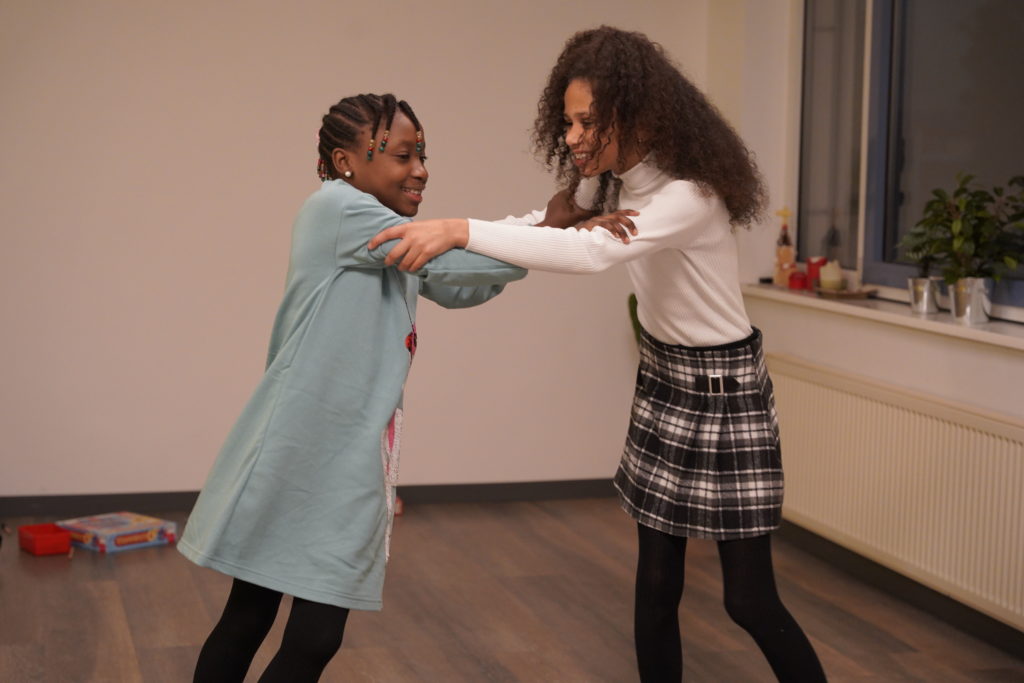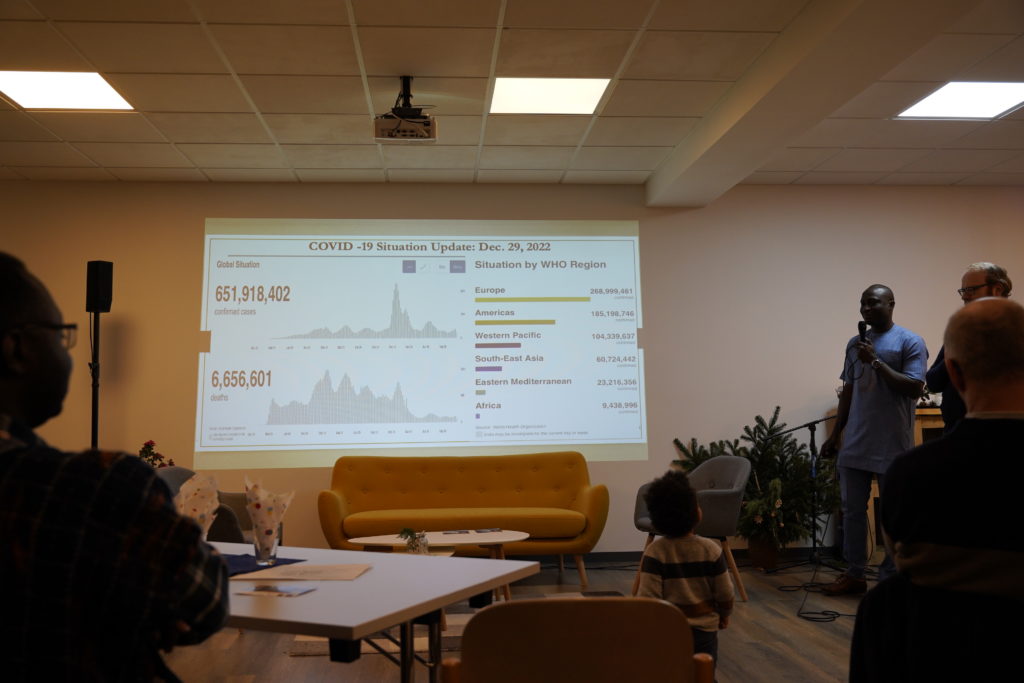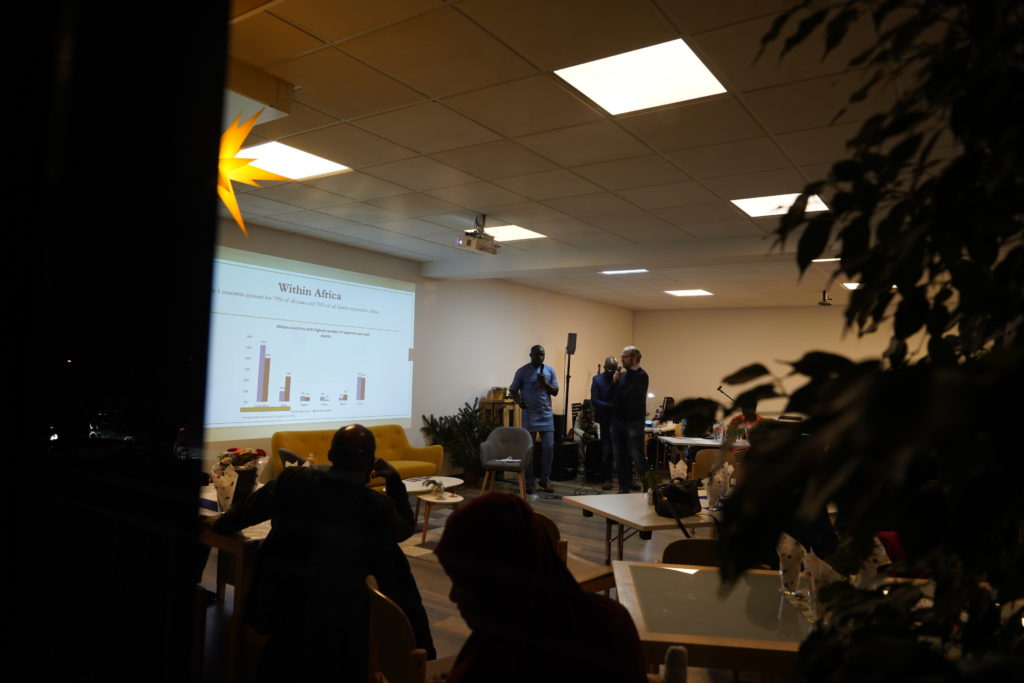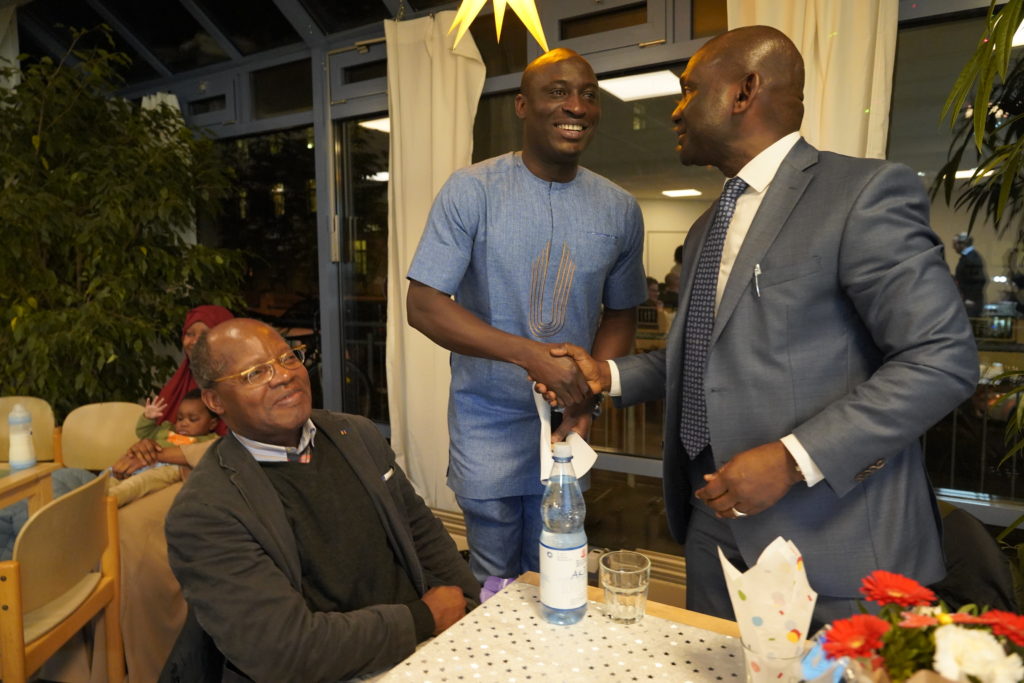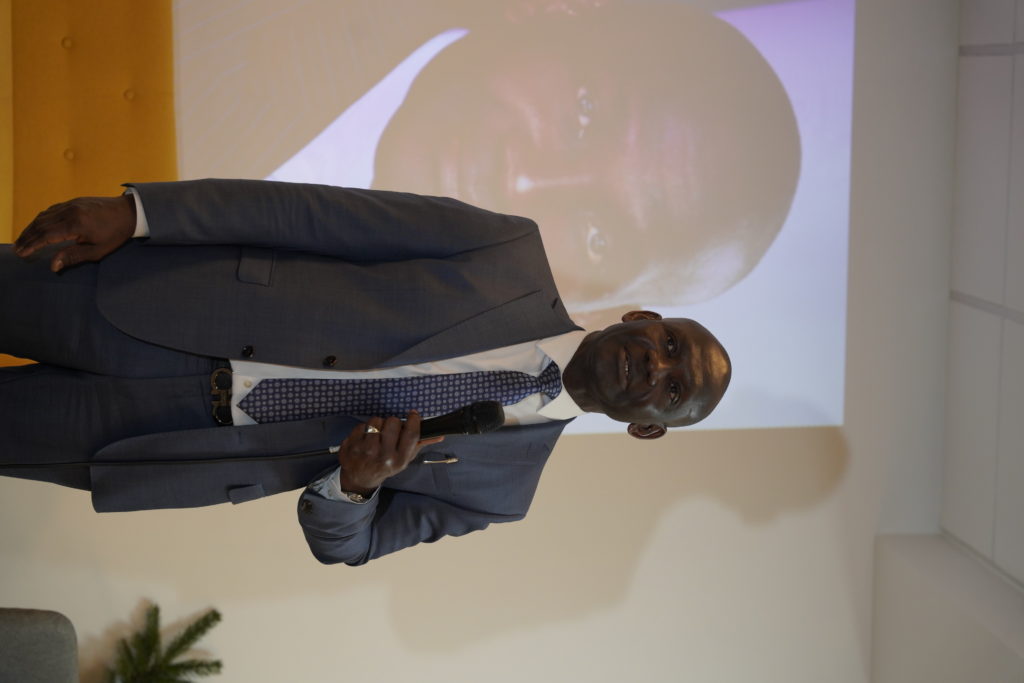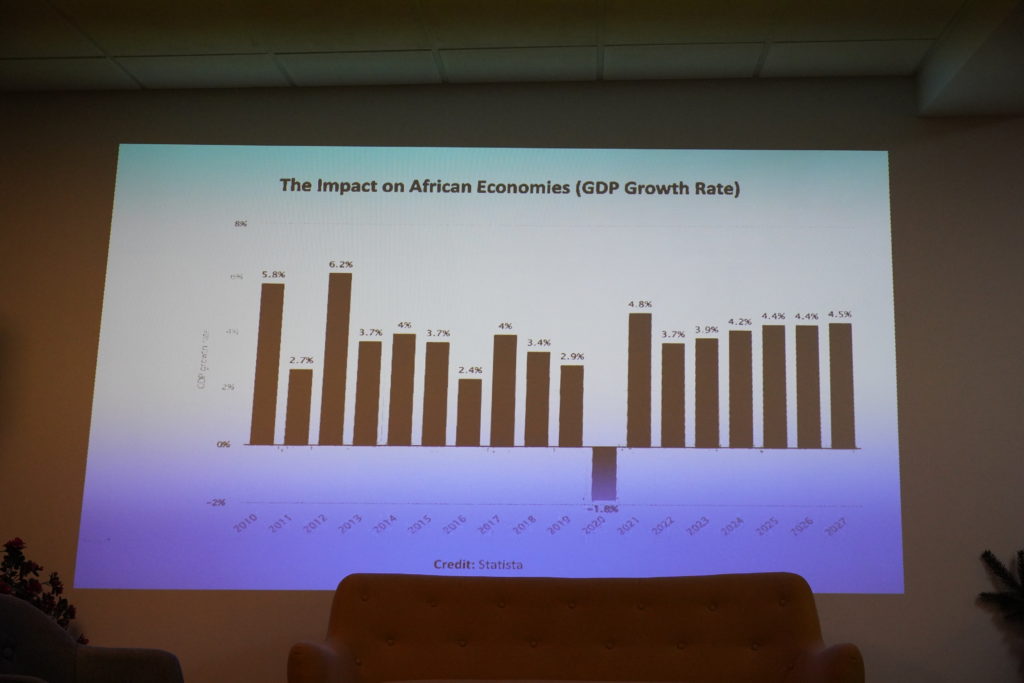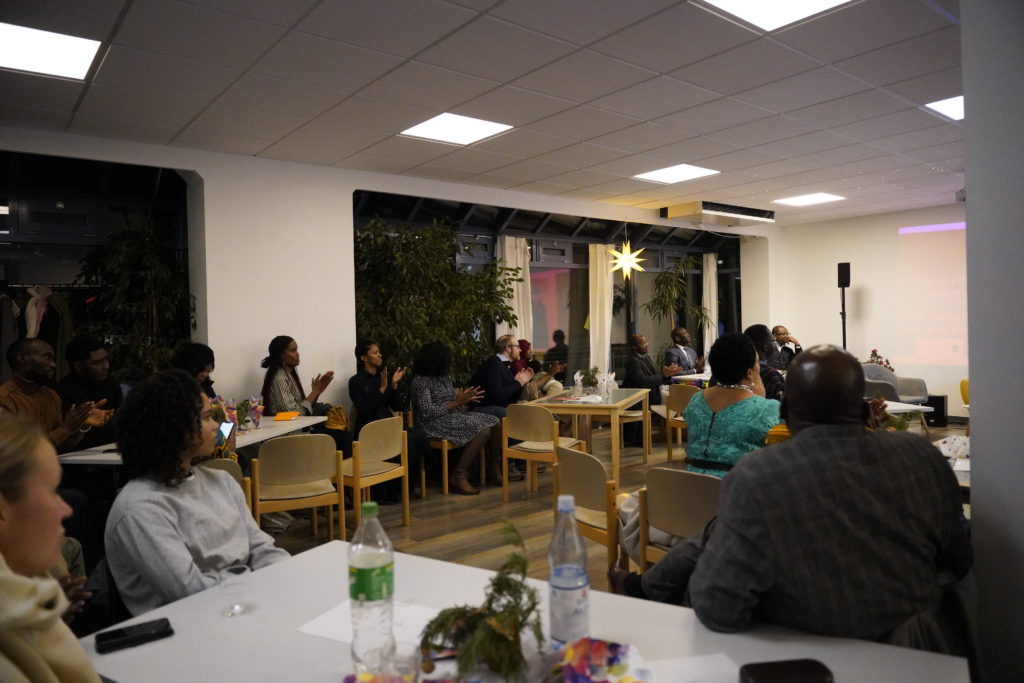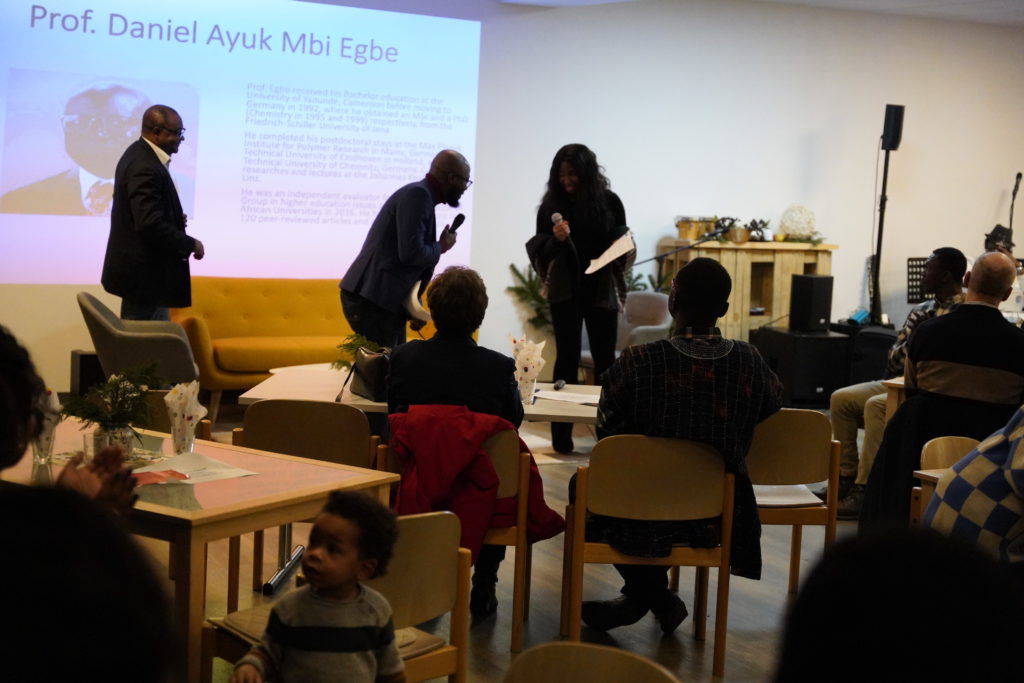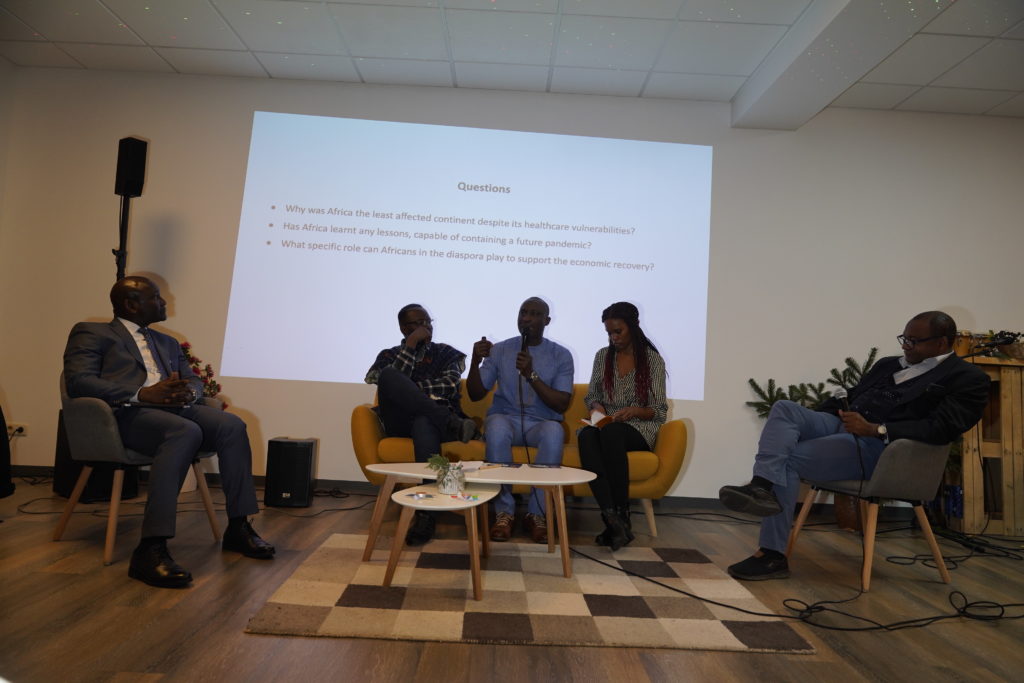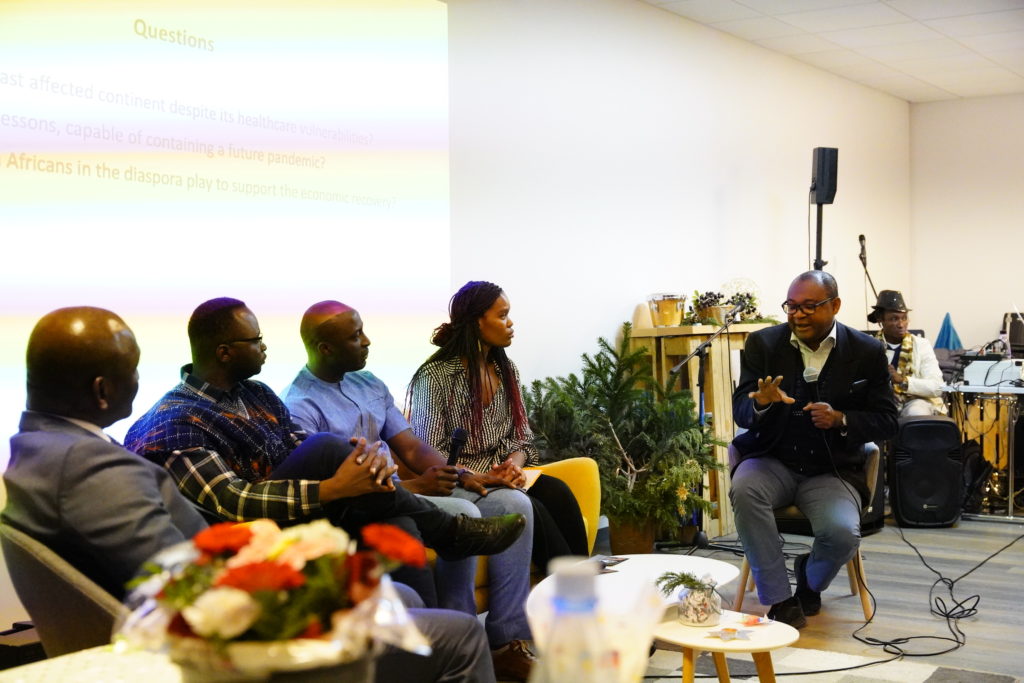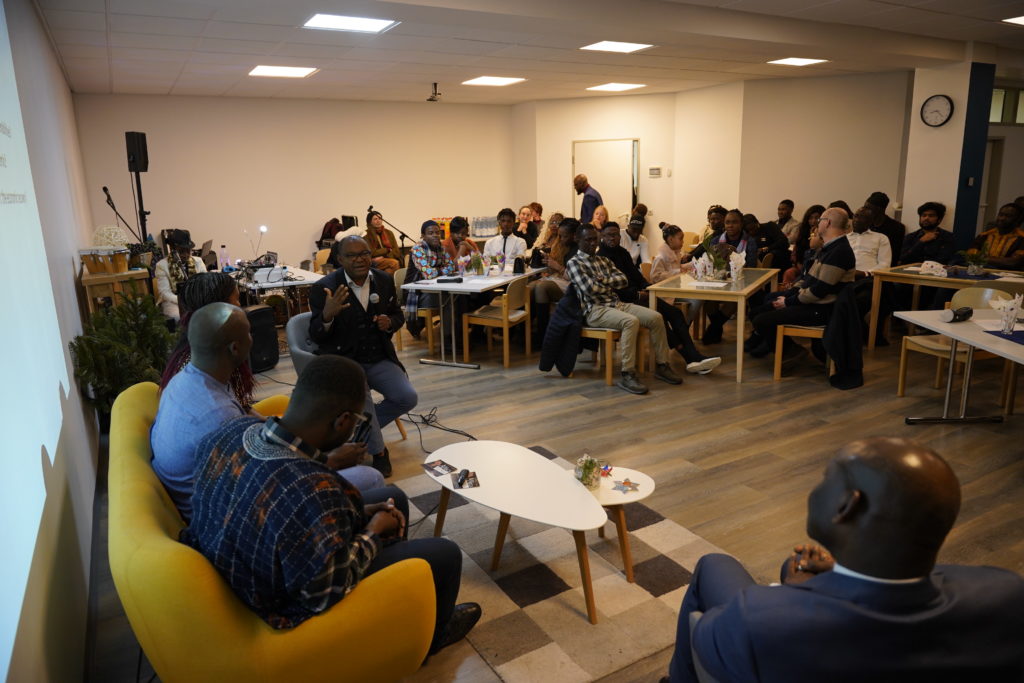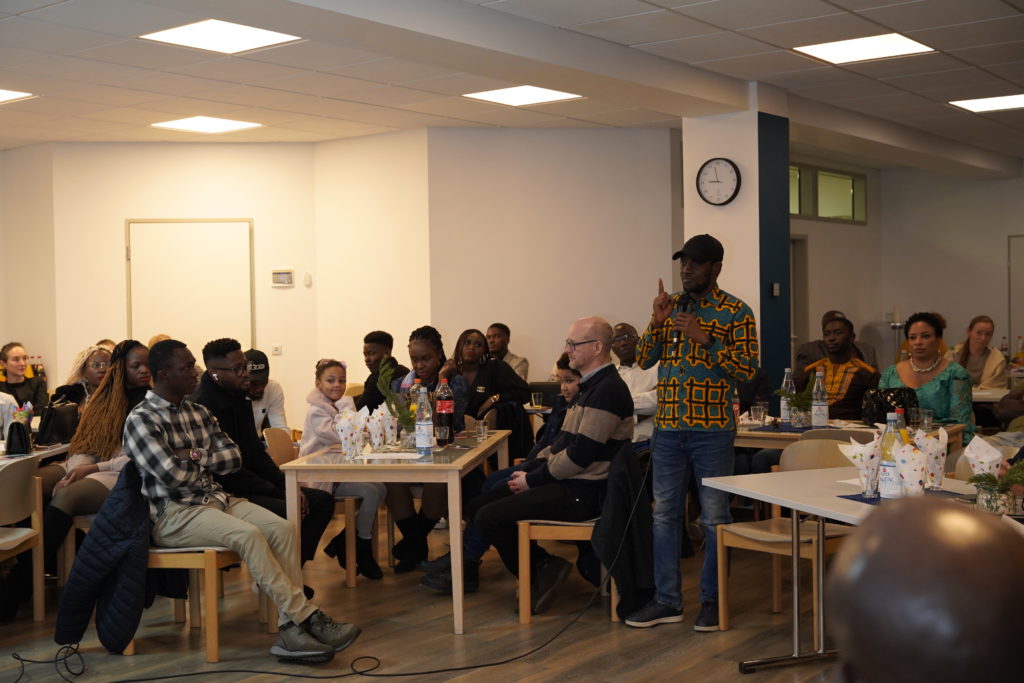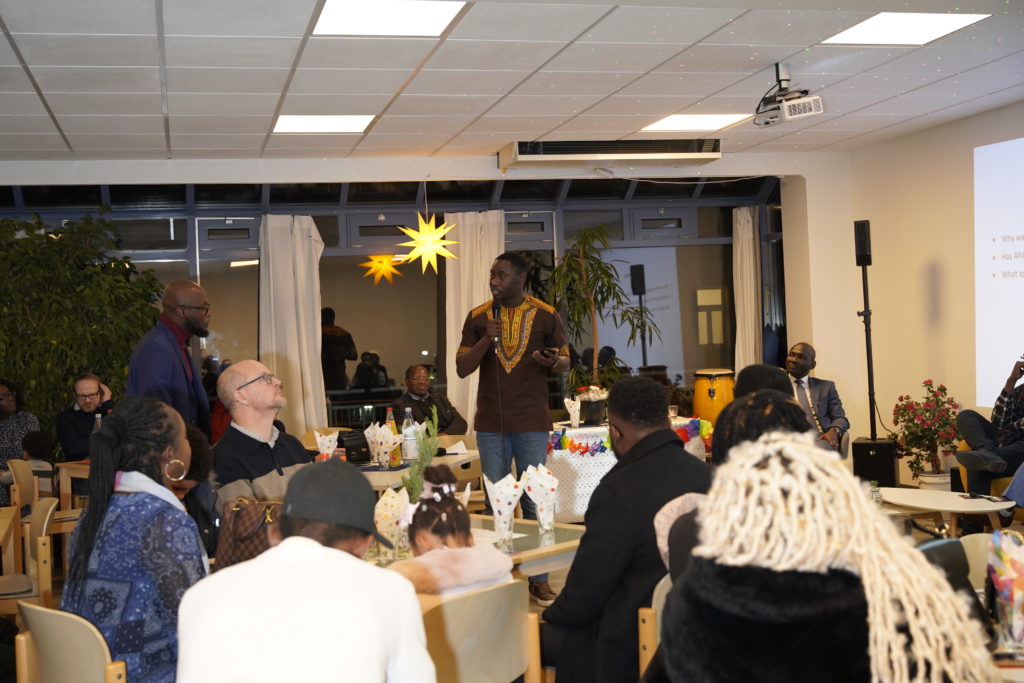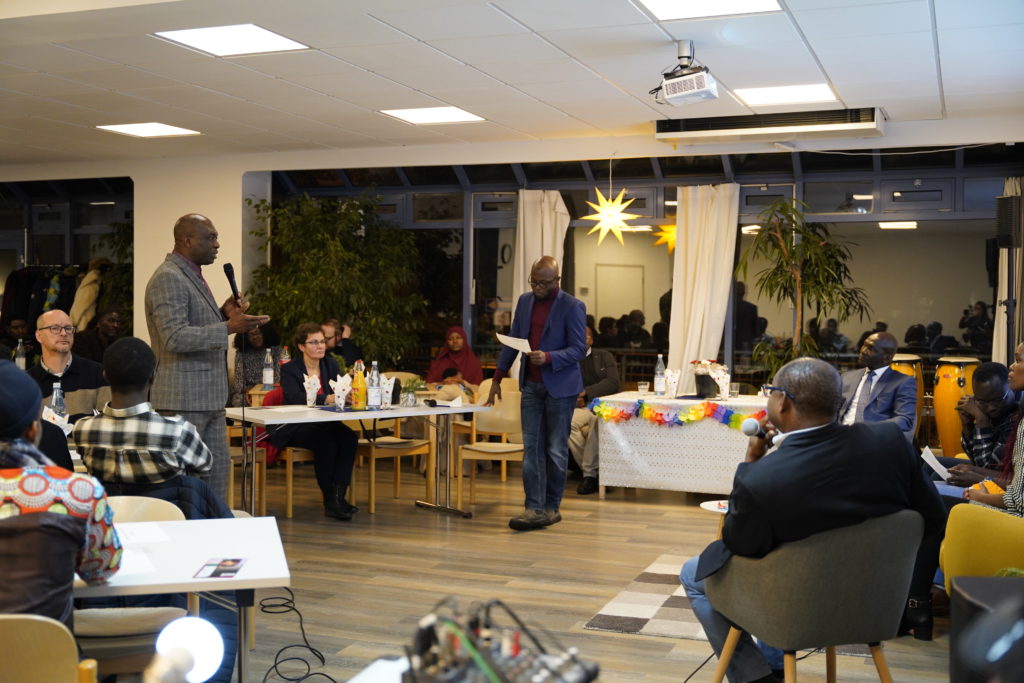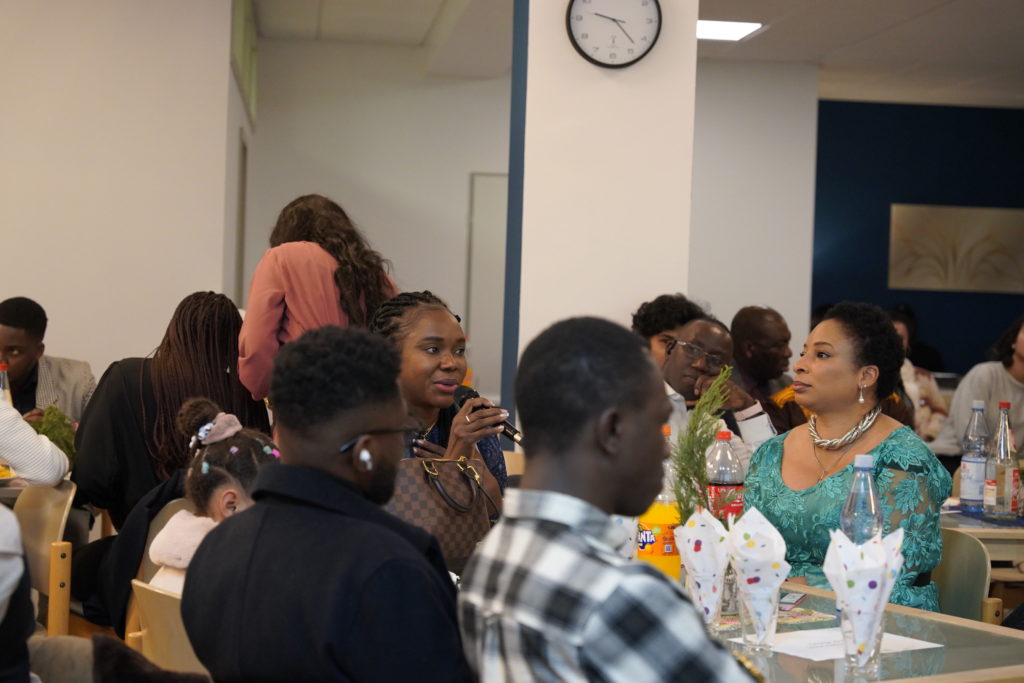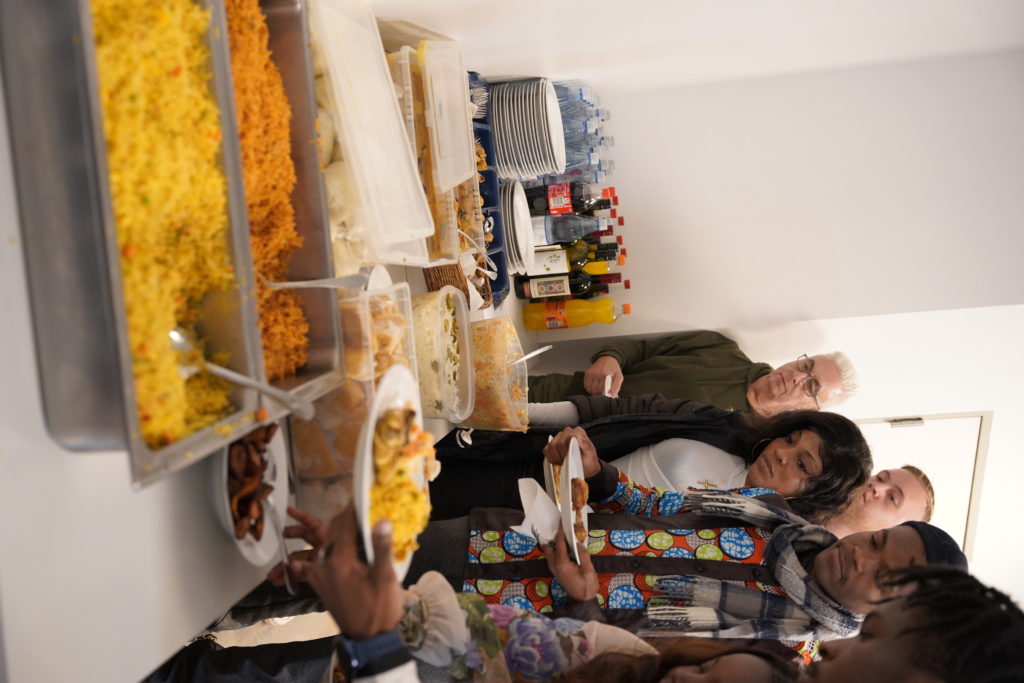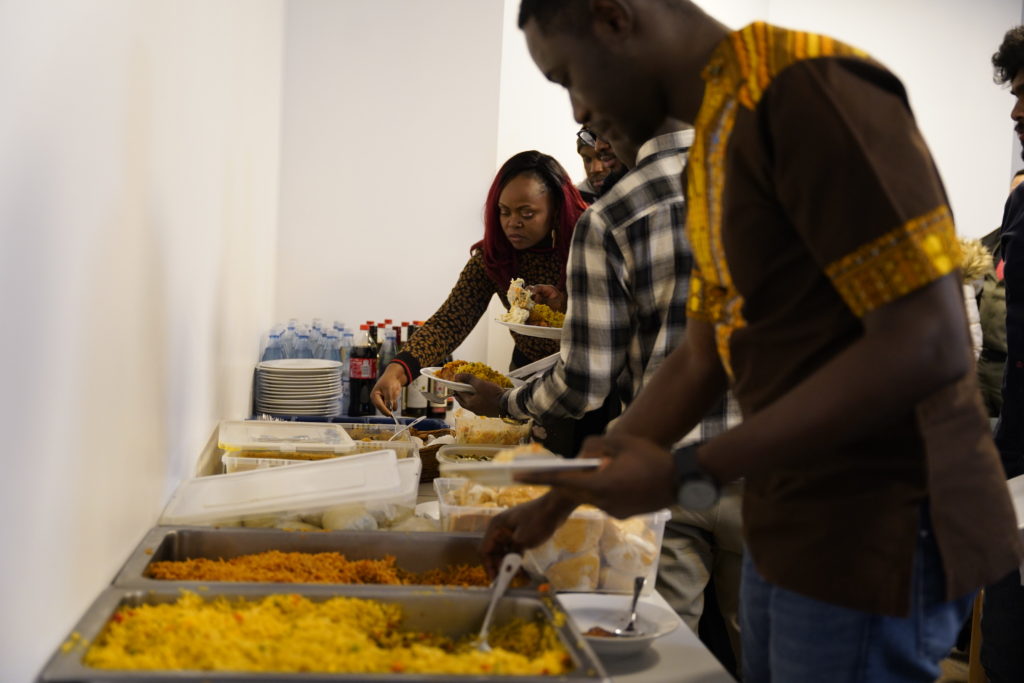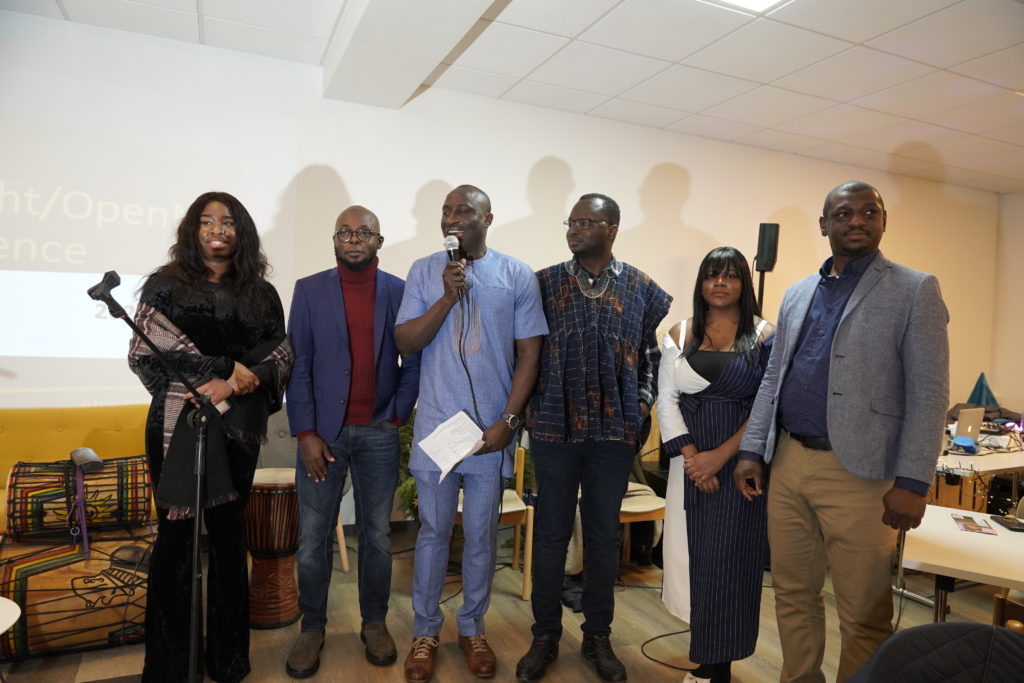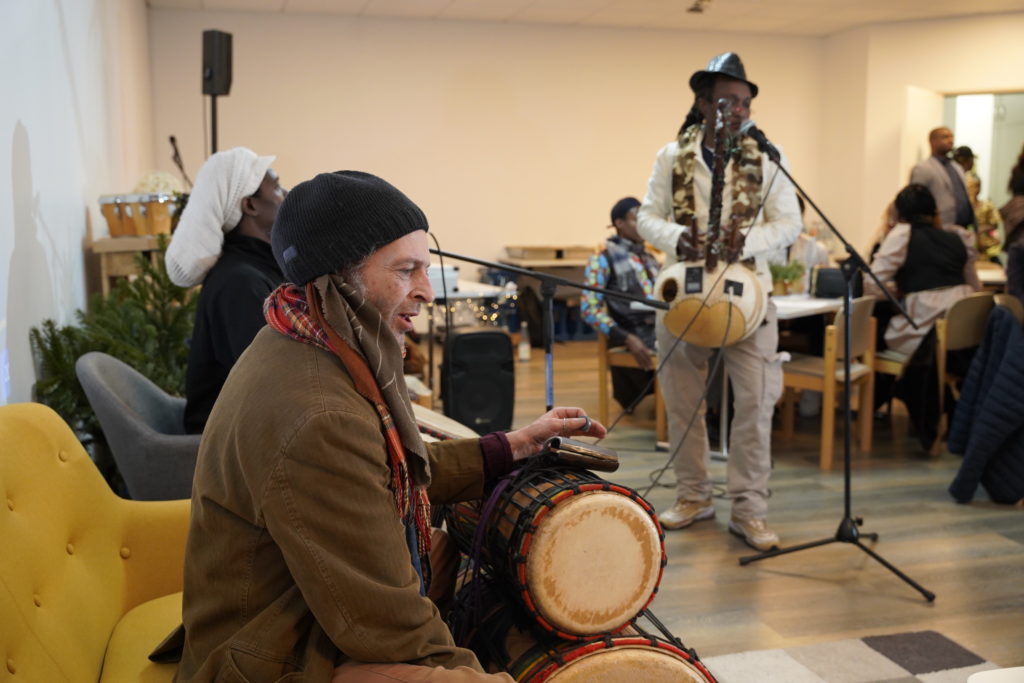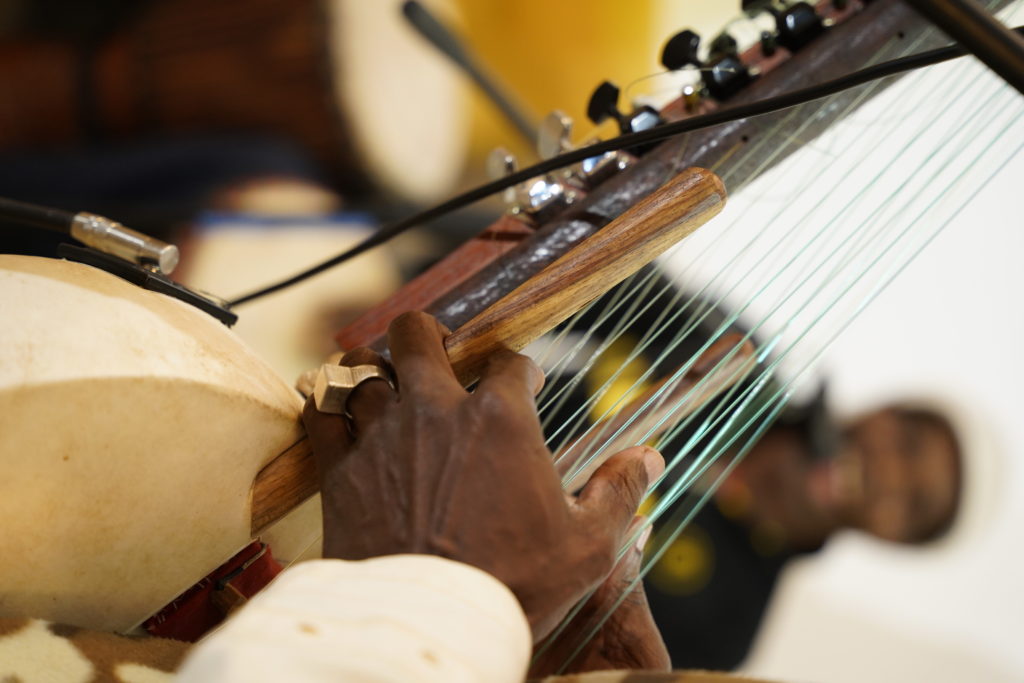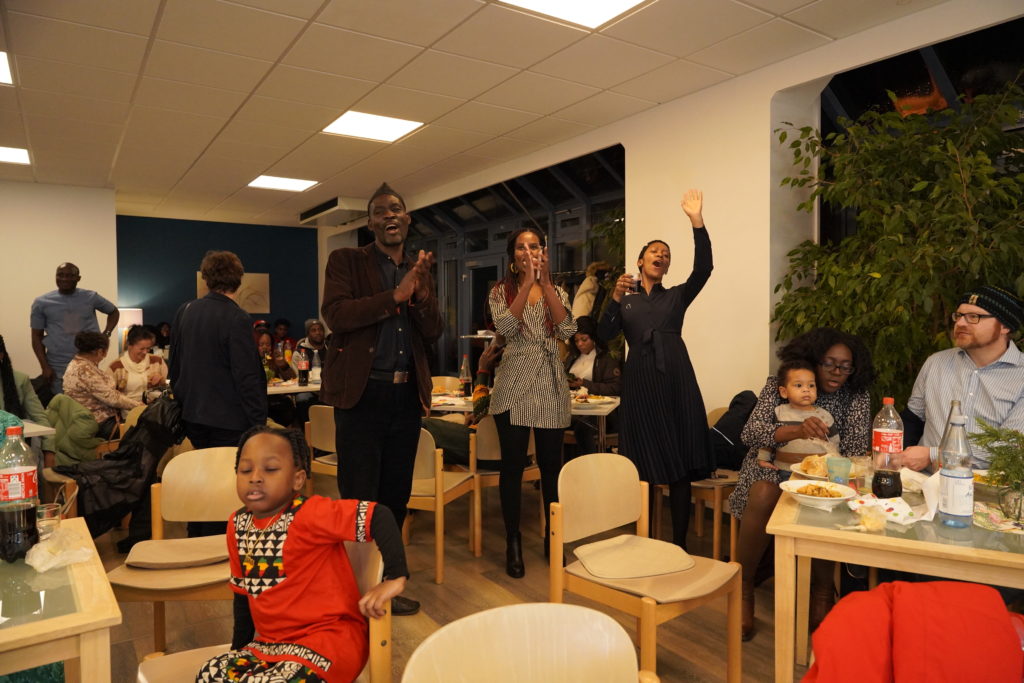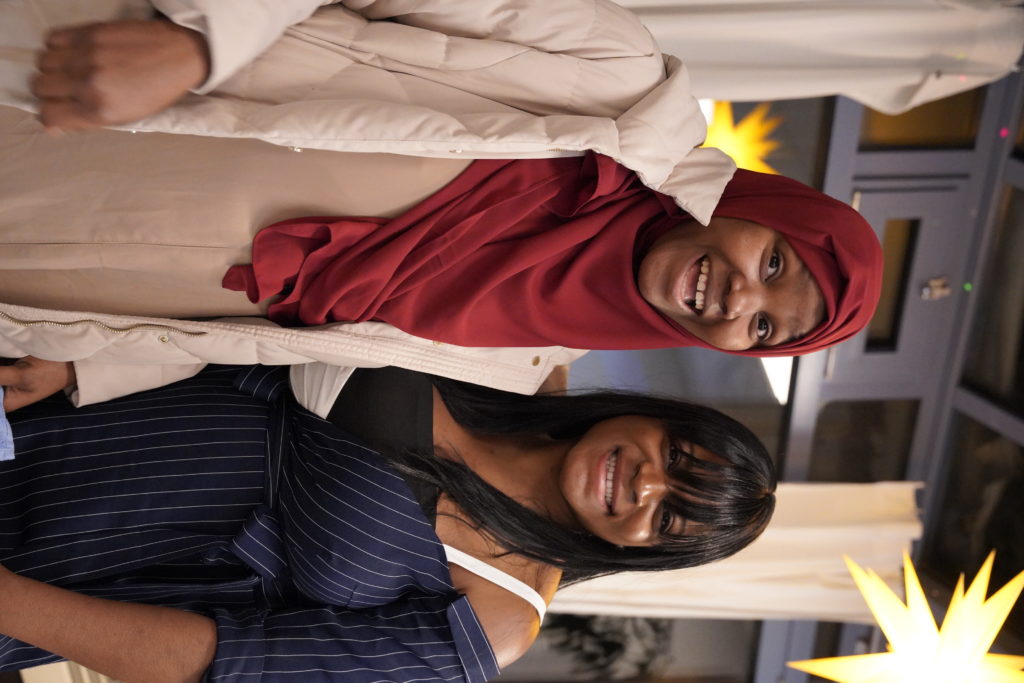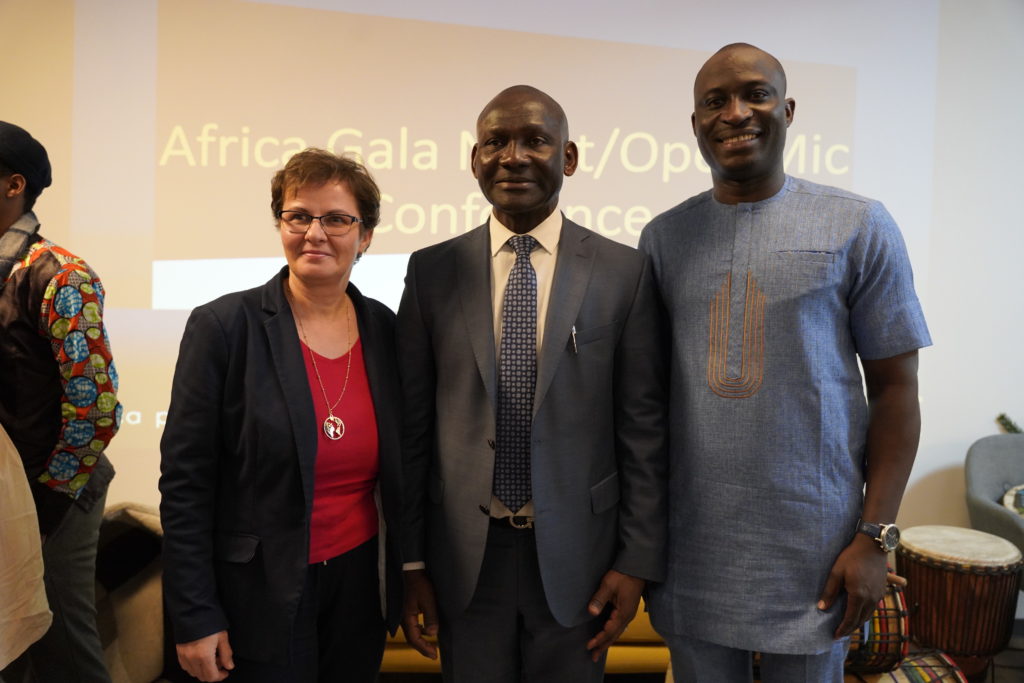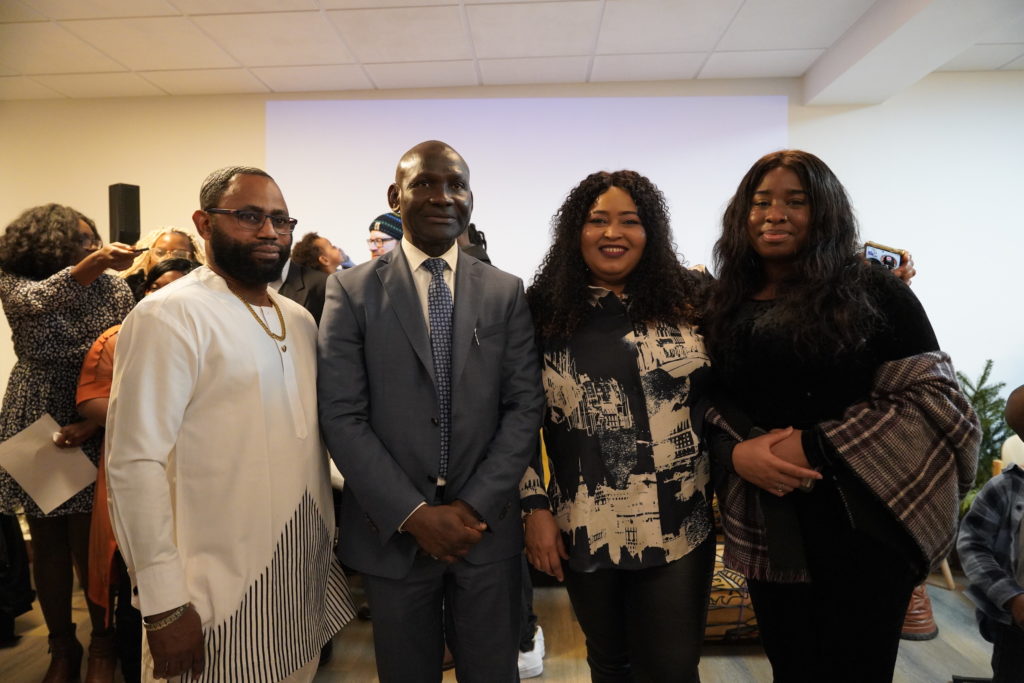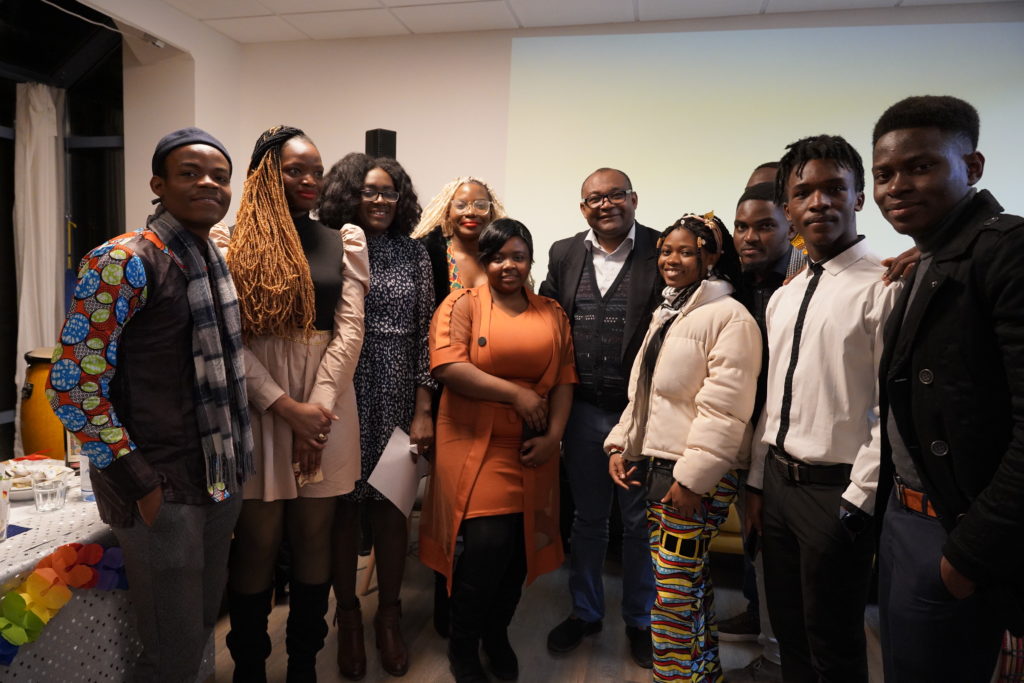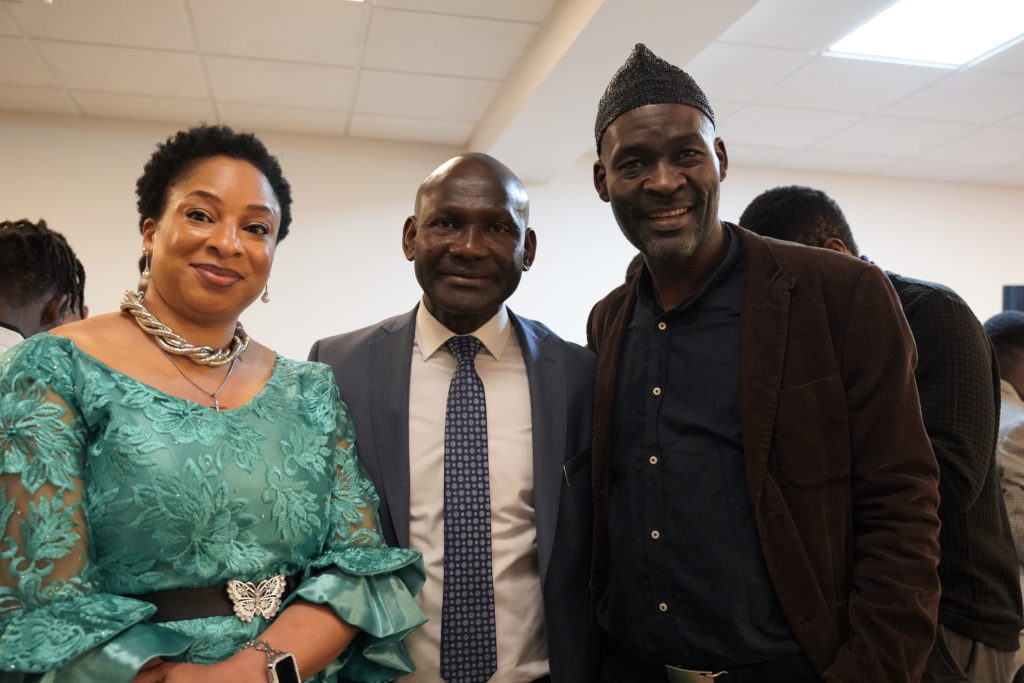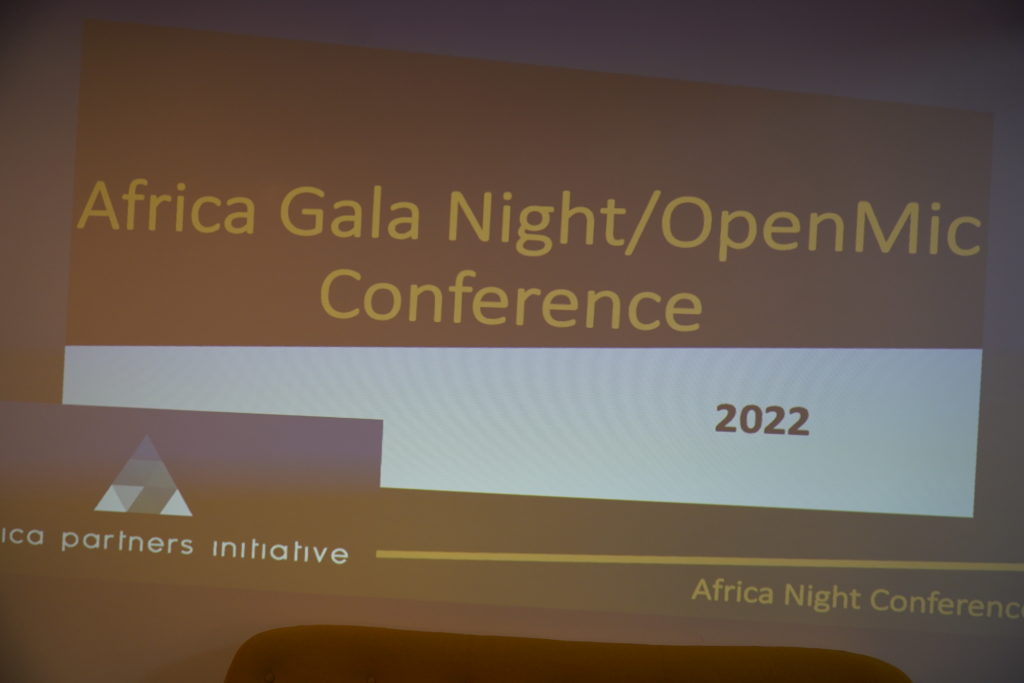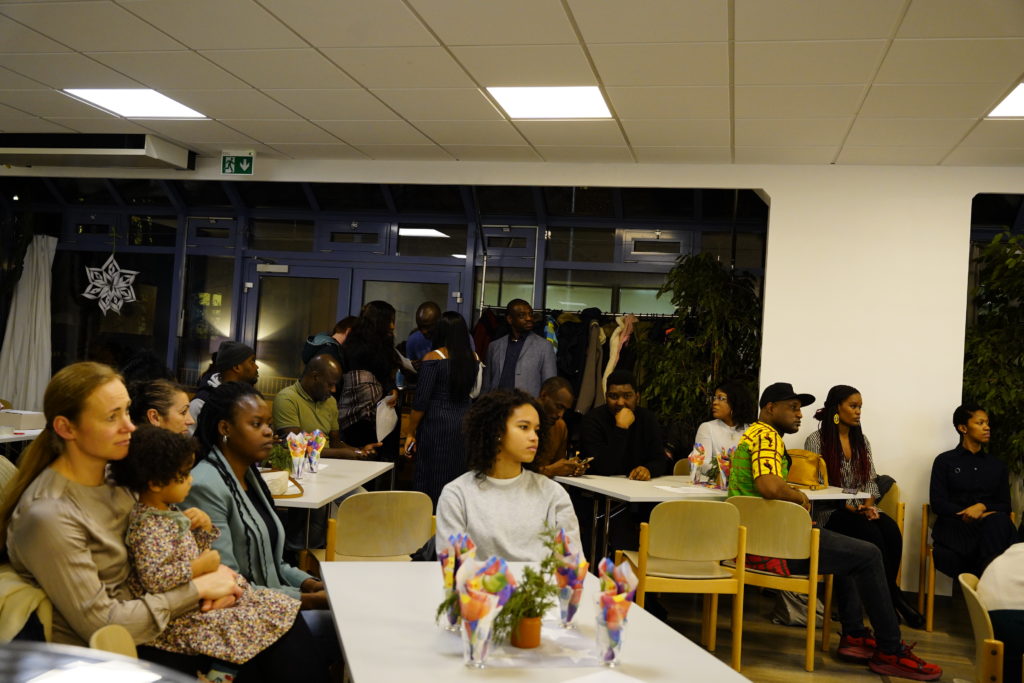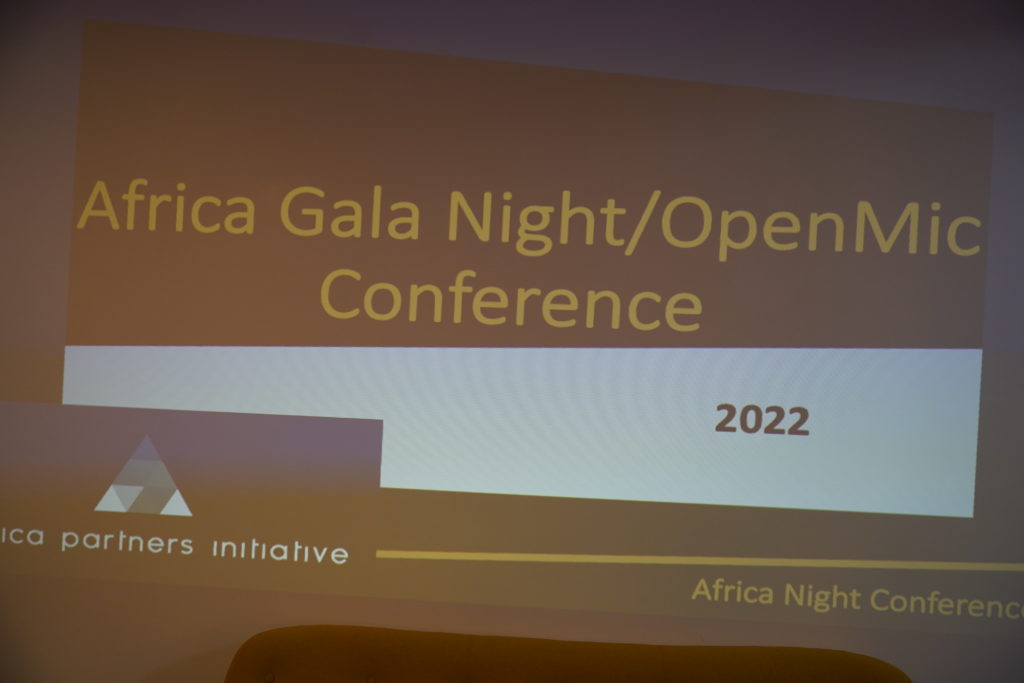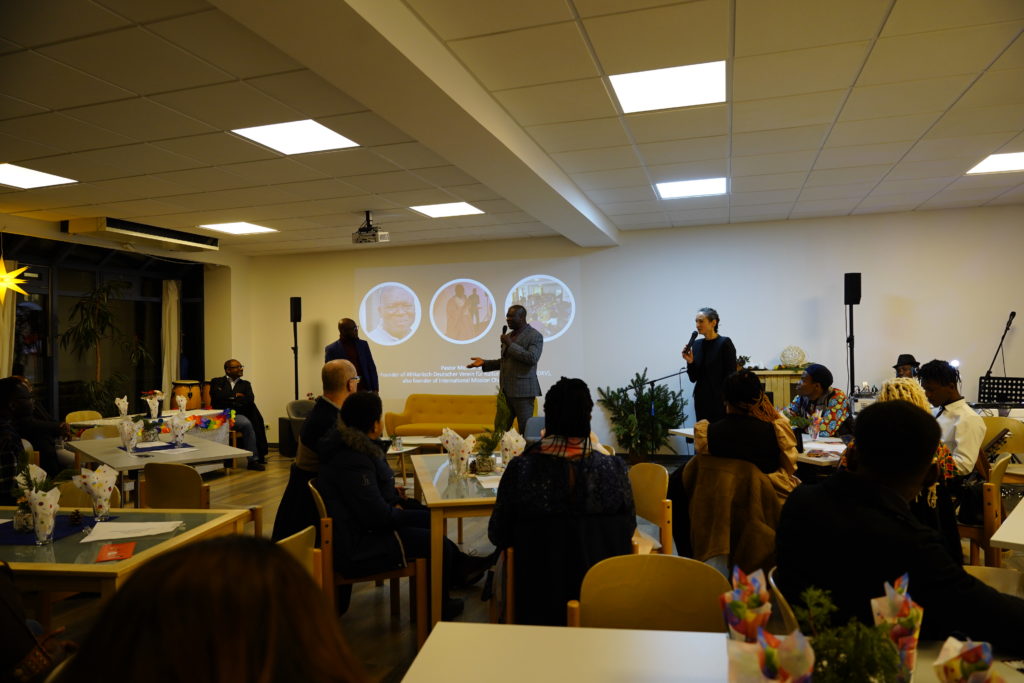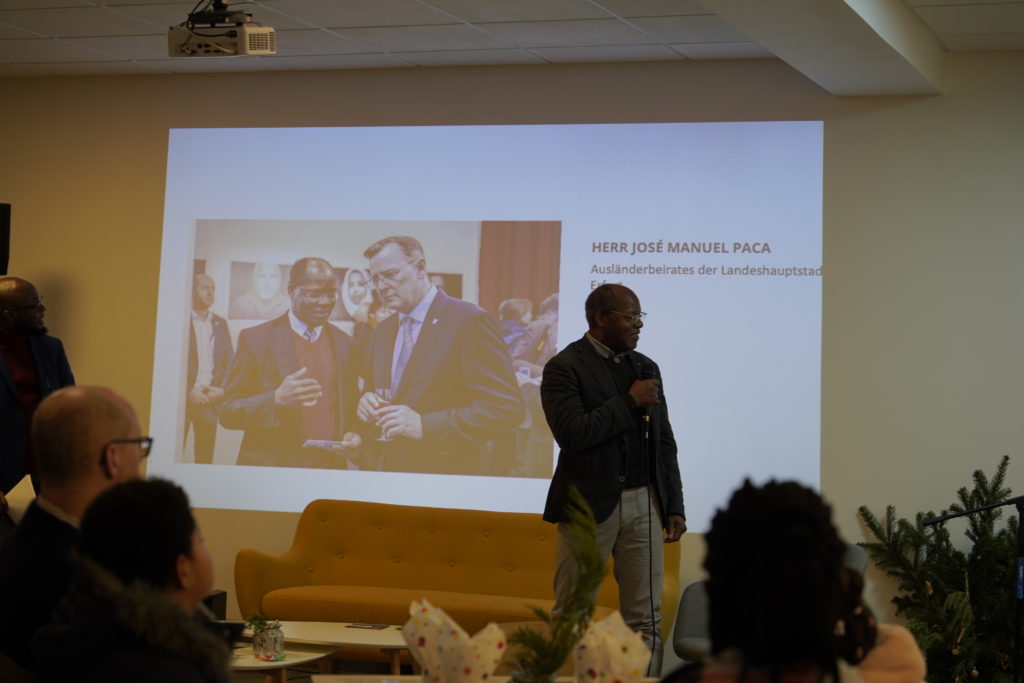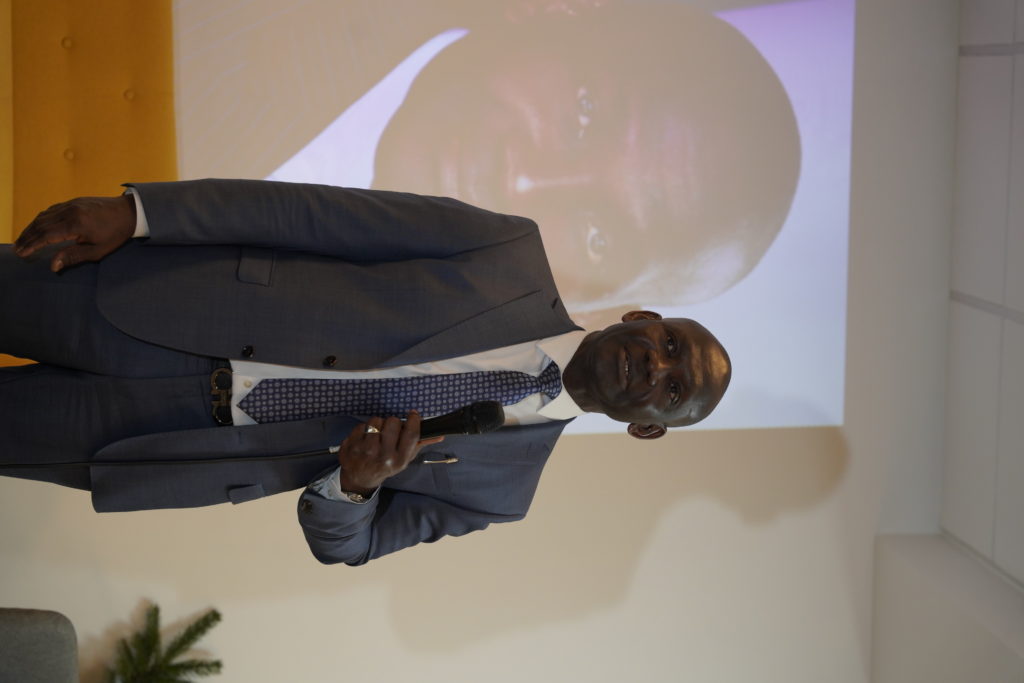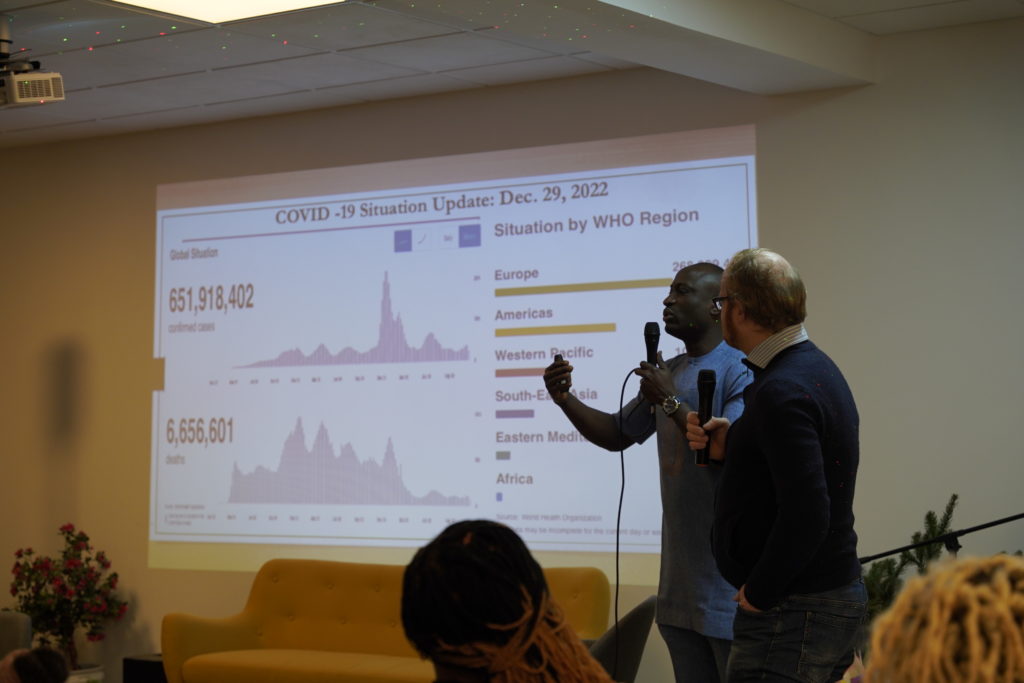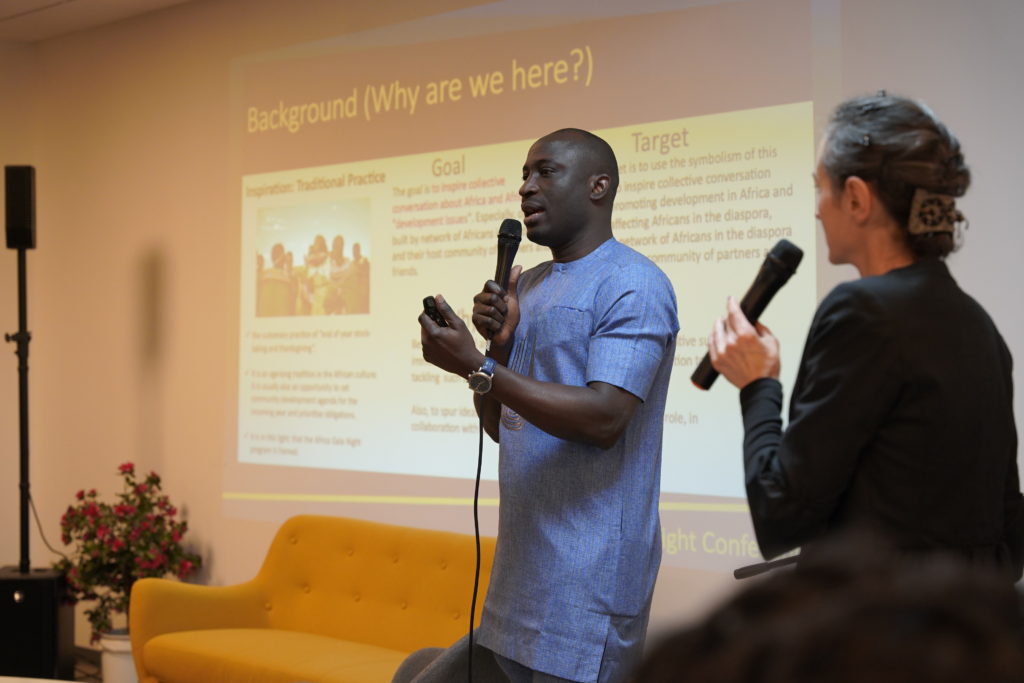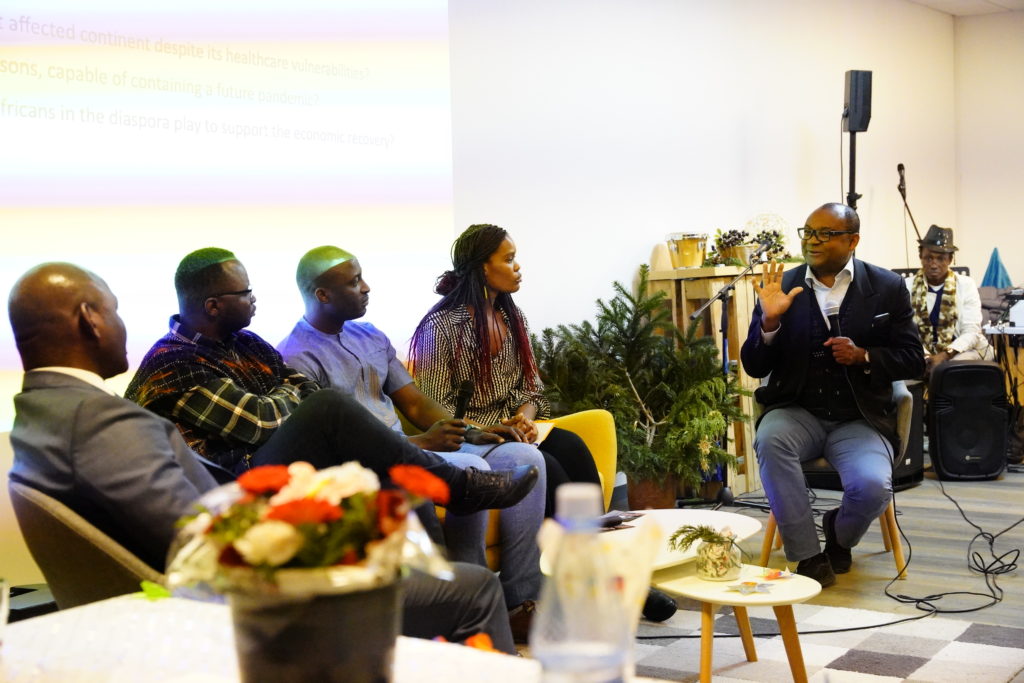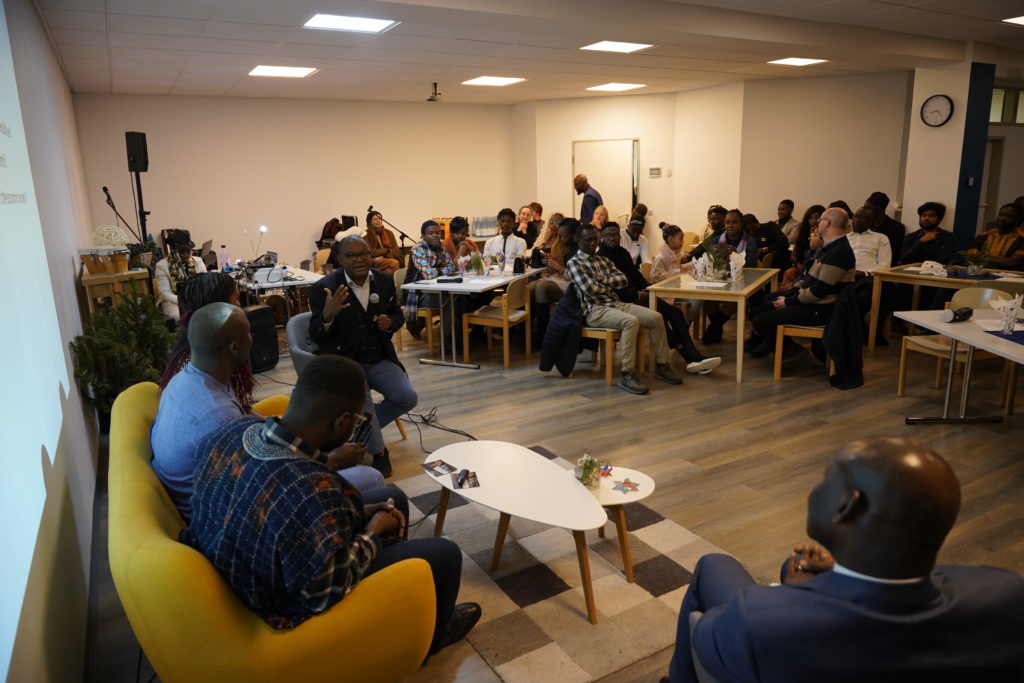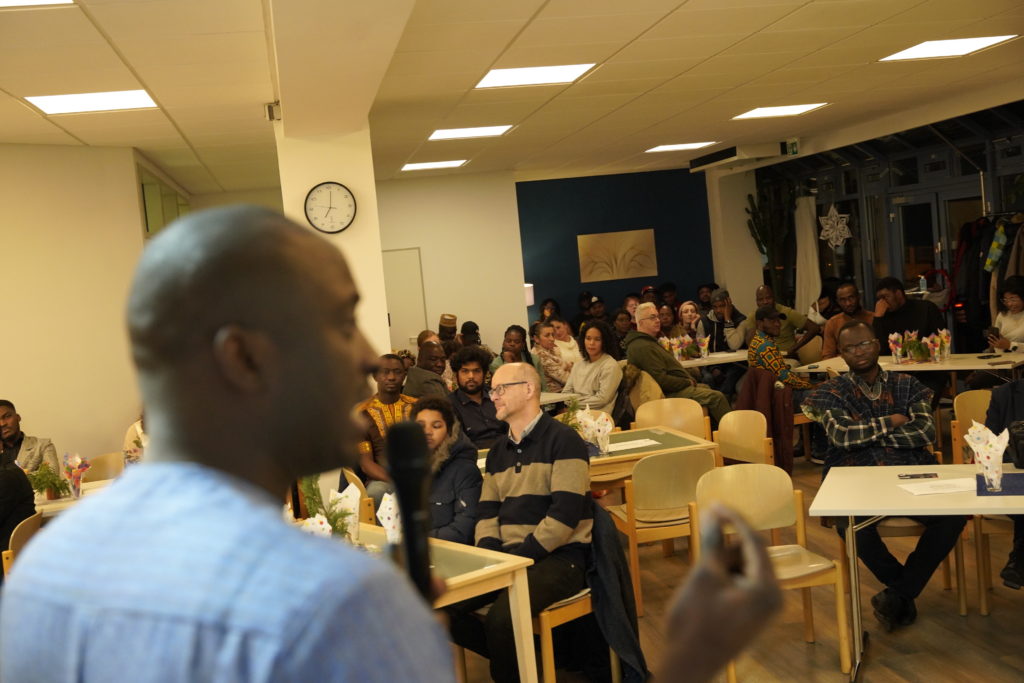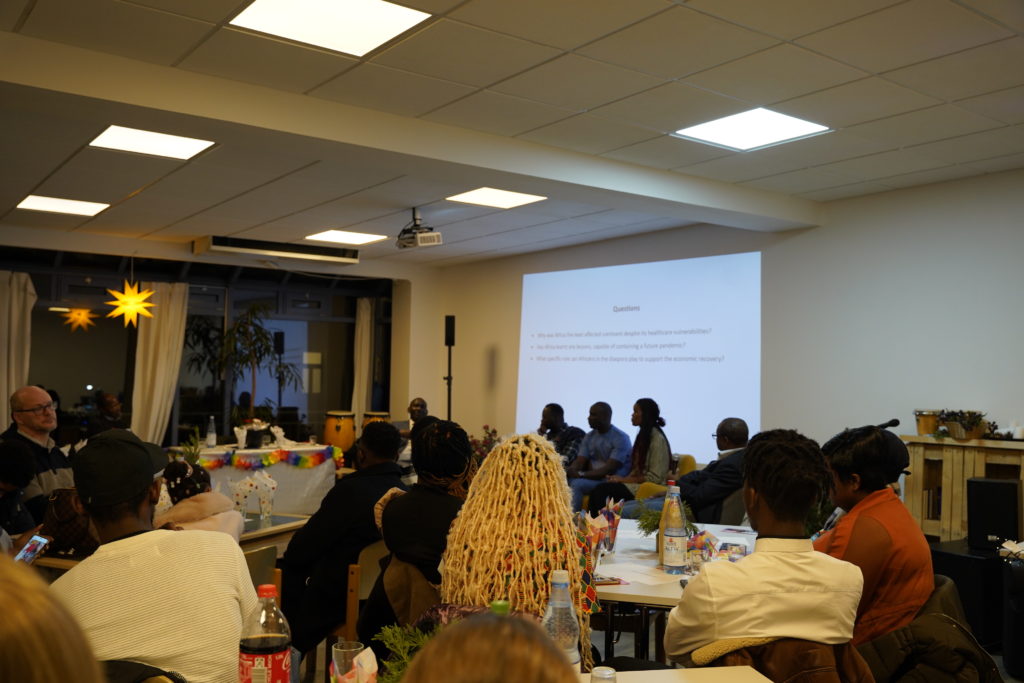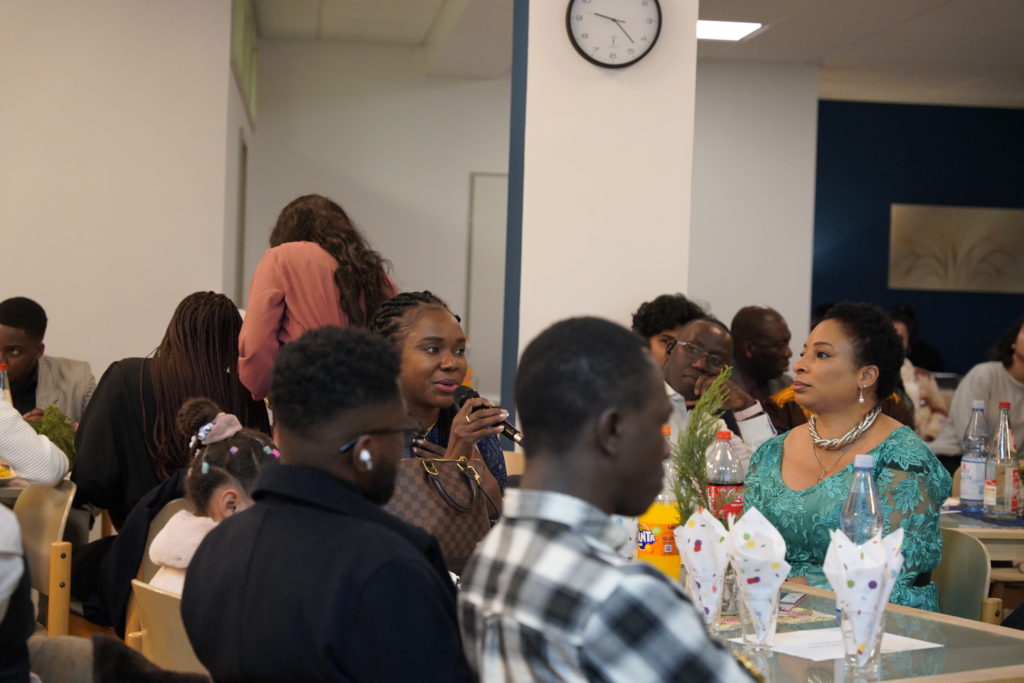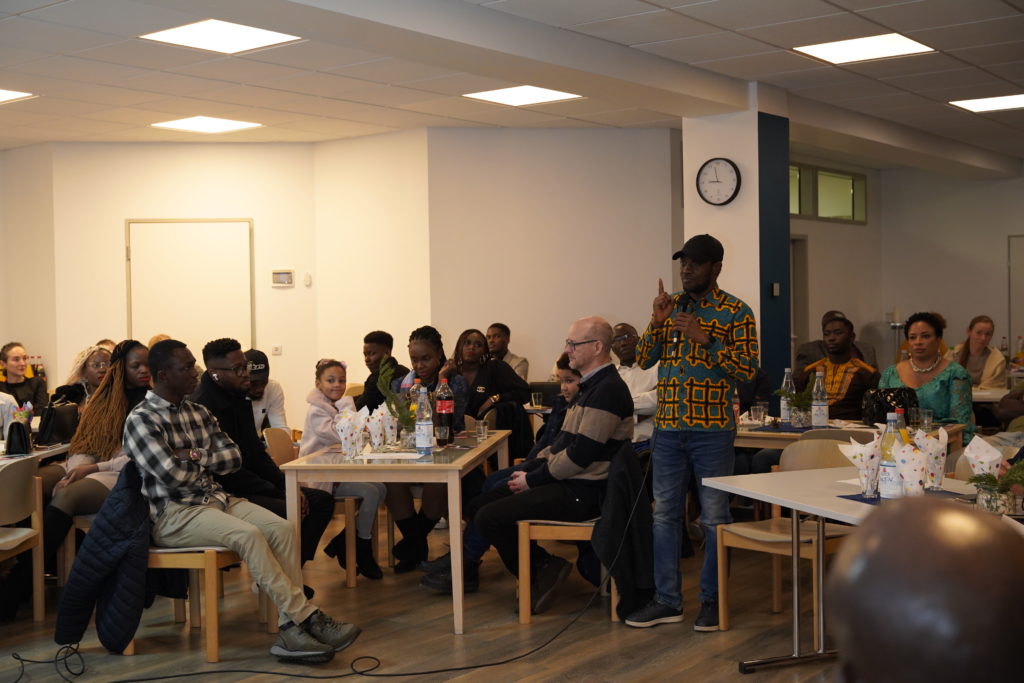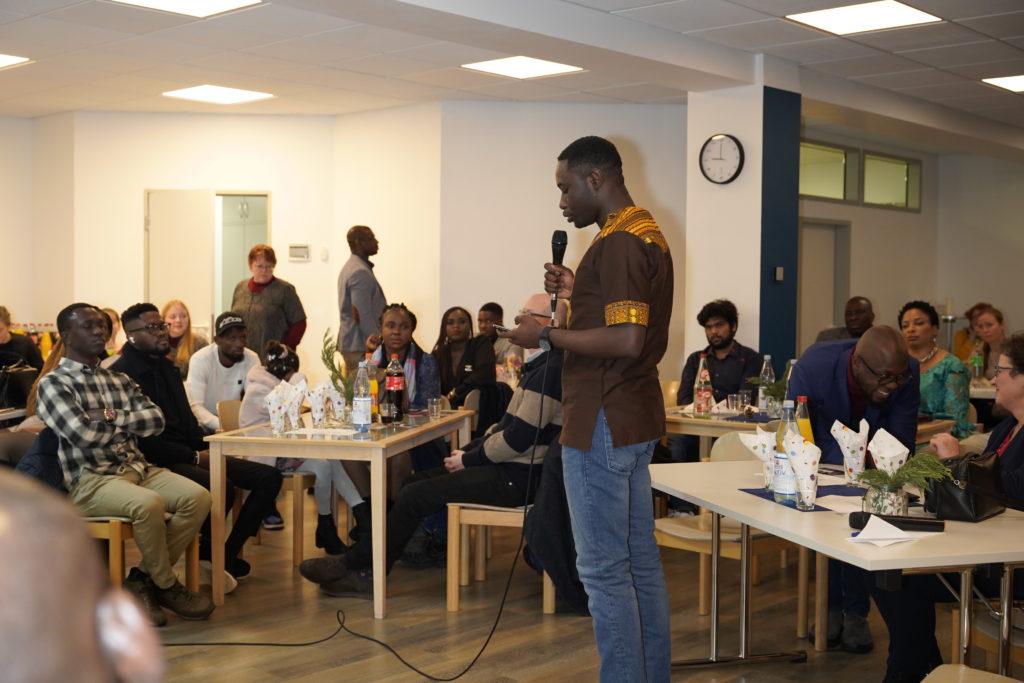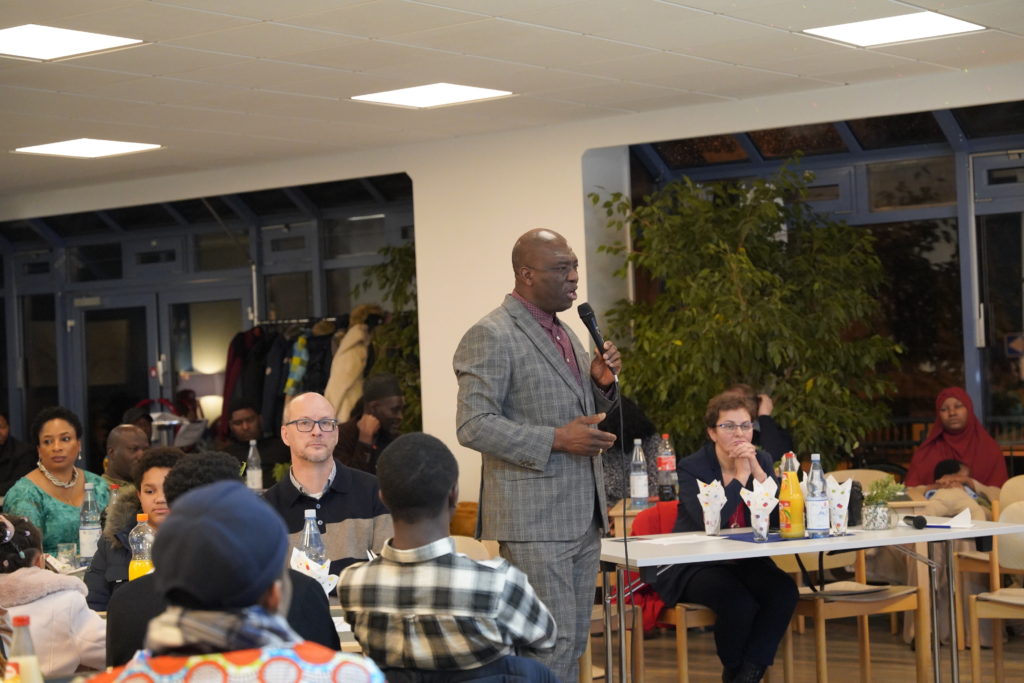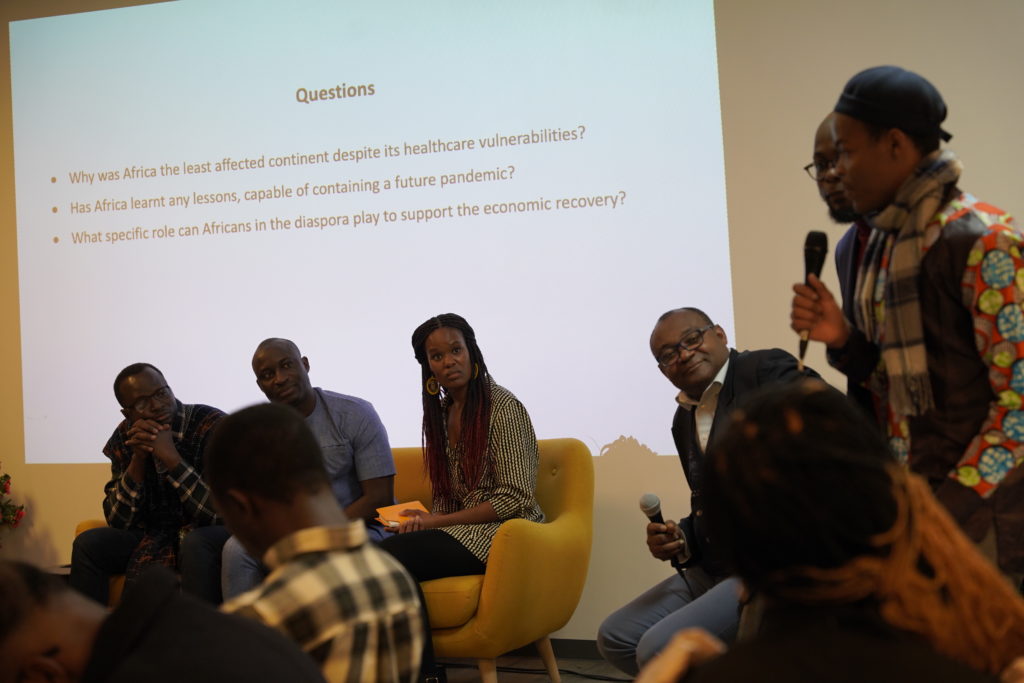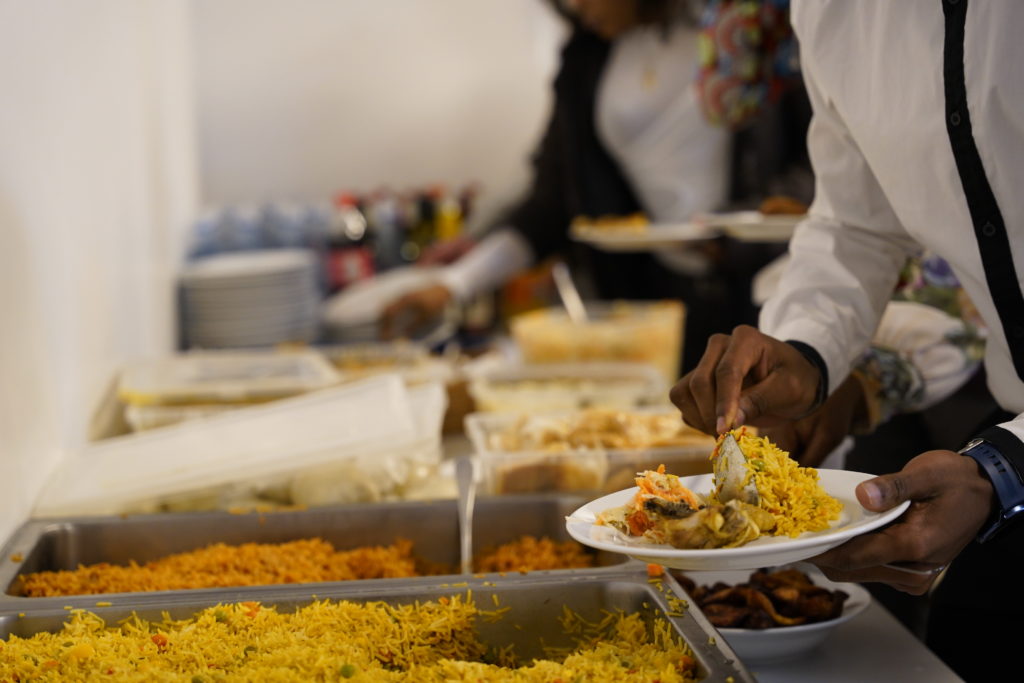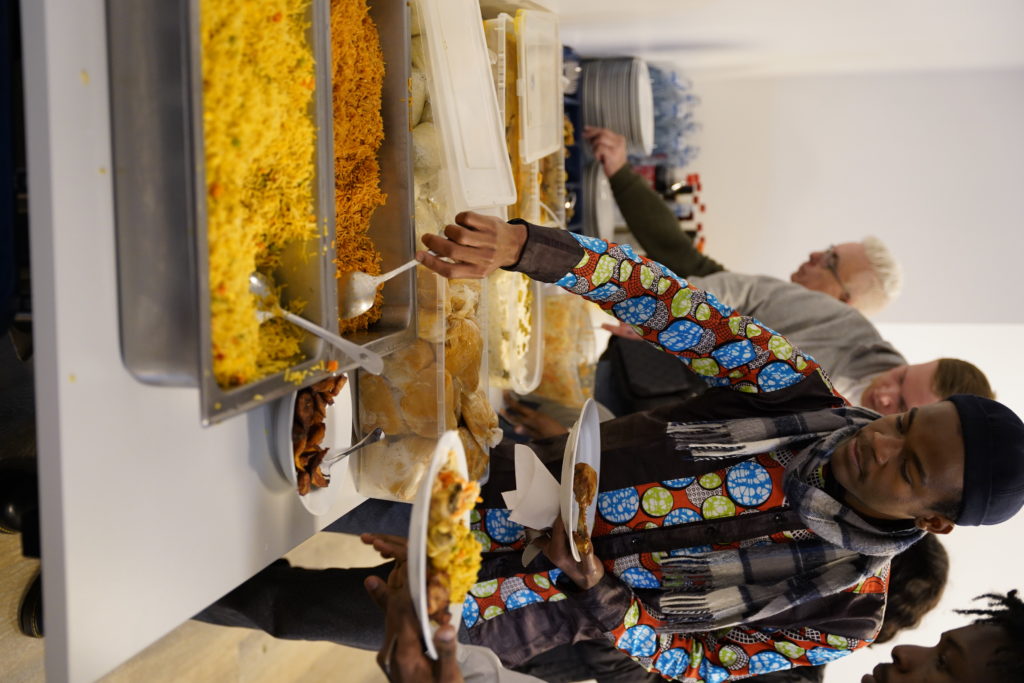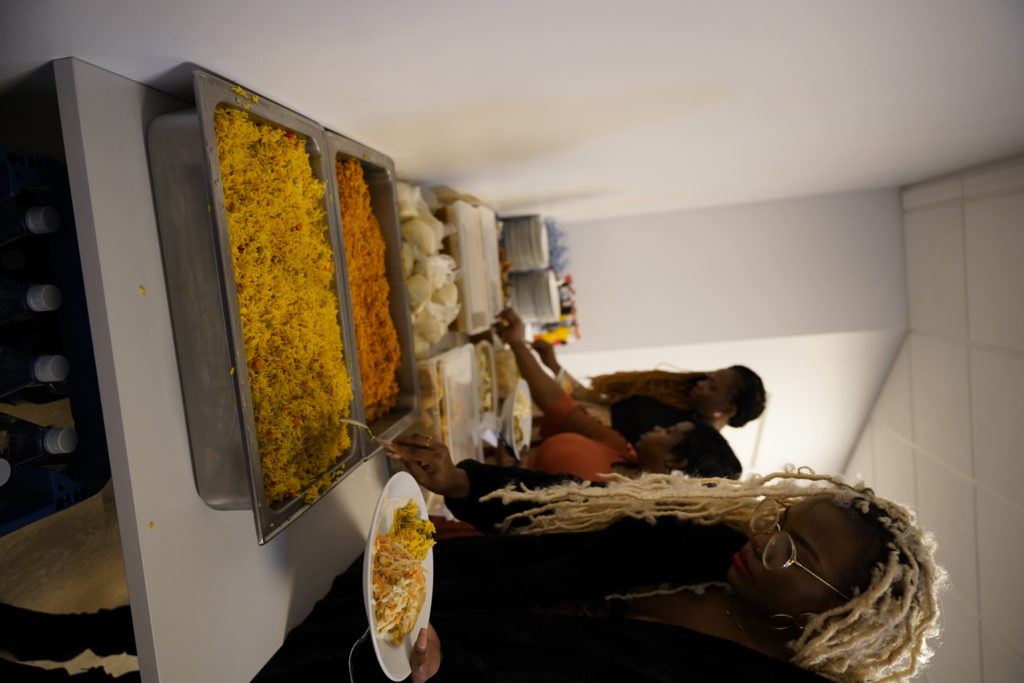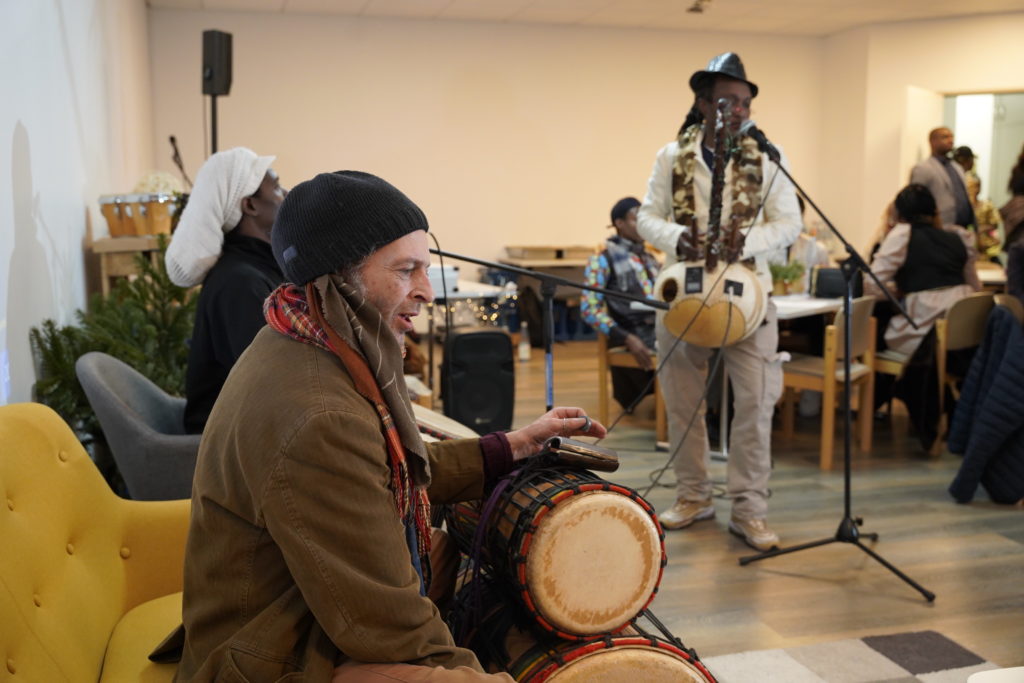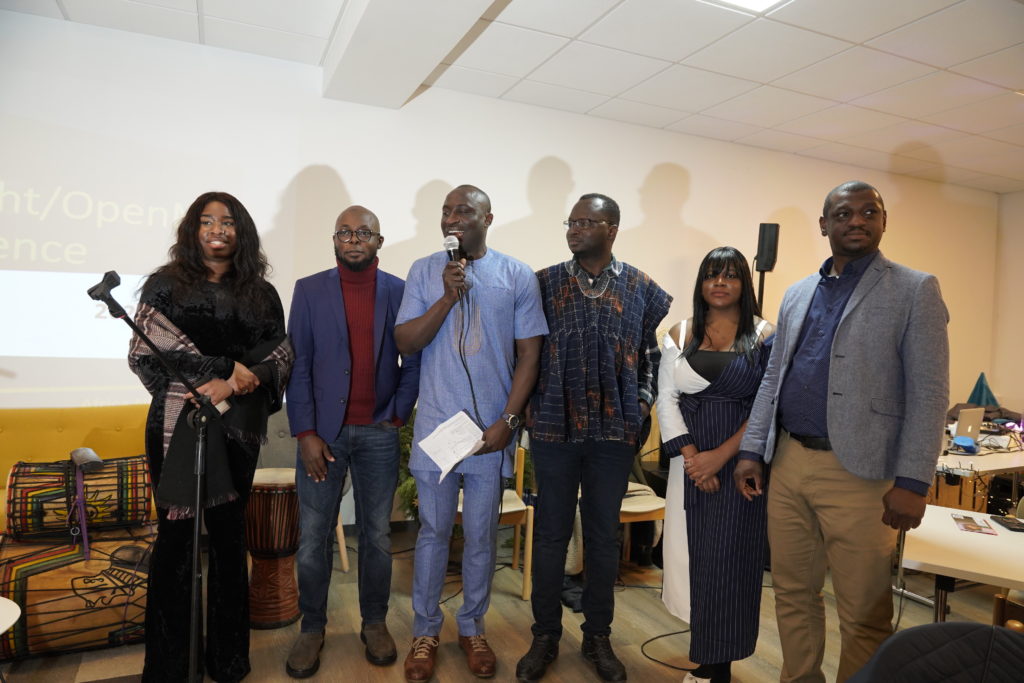REPORT OF 2022 AFRICA NIGHT CONFERENCE (30.12.2023).
Arnstädter Straße 50, 99096, Erfurt.
Cross-section of participants at the Africa gala Night Photo credit: Naomi Valdez Almanza I
INTRODUCTION
The Africa Night Conference was initiated in line with the African customary practice of “end-of-year stock-taking and thanksgiving”. End-of-year stock-taking or evaluation of actions and decisions, not just by individuals, but as a society, is an age-long tradition in the African culture: birthing the idea of agenda-setting for the incoming year. That is, besides the appraisal, it is usually an opportunity to set community development goals for the incoming year and prioritize obligations. It is in this light, that the maiden edition of the Africa Gala Night program was conceived.
The goal of the event was to build a network of Africans in the diaspora and collaborators for engagement on Africa’s development issues. It was expected to galvanize African scholars and professionals, and African and German communities; not only to celebrate culture, diversity, and social cohesion but to interact and present or share their opinion on a subject of significant mutual value, especially to Africa’s development. E.g., deepening democracy, addressing the Africa’s emigration problem, human rights, achieving sustainable development goals, addressing vaccine hesitancy, understanding the economic impacts of the COVID-19 pandemic on the African region, etc. The expected outcome was to increase the community of multipliers, inspired by Africans in the diaspora in partnership with friends of Africa.
The 2022 theme was: COVID-19 Pandemic: Understanding its Economic Implications from the African Perspective. The night provided a free atmosphere to participants who delved into the theme and shared ideas on why and how Africans in the diaspora can play a role, in collaboration with the German government, friends, and organizations. The night’s highlight was the podium and plenary discussions relating to why Africa was the least affected continent despite its healthcare vulnerabilities; lessons learned capable of containing a future pandemic; and what specific role can Africans in the diaspora can play to support the economic recovery of the region.
BACKGROUND
The third edition of the Africa Gala Night Conference took place at Arnstädter Straße 50, 99096, Erfurt: on December 30, 2022. The program began at 18:00 and formally ended at 22:00…while the afterparty ended at 00:00. A total of 64 participants (adults only) attended the conference (appendix 3). The attendee’s affiliation cut across different spectrum of endeavours, including academia, the private as well as the public sector, church, and from the African and German Communities: University of Erfurt, Friedrich Schiller Universität Jena, Technical University Ilmenau, Afrikanisch-Deutscher Verein für Kultur und Bildung e.V., The Redeemed Christian Church, etc. Similarly, the diversity cut across countries such as Nigeria, Germany, Hungary, Cameroon, Burkina Faso, Ghana, South Africa, Benin, DR Congo, Gambia, etc.
Photo credit: Naomi Valdez Almanza
OPENING REMARKS
The opening remarks of the Gala Night was delivered by Pastor Michael Sia and Mr. José Manuel Paca. Pastor Michael Sia, the Founder of Afrikanisch-Deutscher Verein für Kultur und Bildung (ADKV), and also the International Mission Church, Erfurt spoke broadly about the importance of unity and discipline in the African community.
Pastor Michael Sia during his opening remark
Mr. José Manuel Paca gave the second opening remark of the night. Mr. Paca is the Vorsitzender des Ausländerbeirates der Landeshauptstadt Erfurt. He gave a 15-minute talk on the importance of political participation and inclusion among Africans in Thüringen and Germany in general.
Mr. José Manuel Paca giving opening remark
WELCOME ADDRESS
The welcome address was delivered by His Excellency, Ambassador Wahab A. Akande, the Consul-General, to the Consulate General of the Federal Republic of Nigeria to Germany (Frankfurt). His speech was centred on the importance of forging a collective purpose among Africans in the diaspora towards supporting Africa’s development. Also, he encouraged Africa Partners Initiative e.V. (API) to continue to explore collaboration between Africa’s diasporan experts and Germans on knowledge exchange between the two regions. Furthermore, he reiterated that the mission of the Federal Republic of Nigeria in Germany is to support citizens toward achieving their goals and creating an enabling environment for mutually beneficial bilateral relations. The mission is open and always available to help Nigerians solve the challenges they face here in Germany. The Mission of Nigeria in Germany has enabled good diplomatic relations that foster increase economic and political relations between the two countries. Finally, he commended the API for organizing such a conference and its theme, which seeks Africans in the diaspora’s involvement in the developmental process of the region and respective countries, especially in achieving the Sustainable Development Goals (SDGs) outlines in the organization’s mandate. Amb. Akande promised to support and attend the subsequent Africa Gala Night conference while his mission in Germany lasts.
HE Amb. Wahab A. Akande giving a welcome address
Photo credit: Naomi Valdez Almanza
AGENDA SETTING
The 2022 program and theme were officially presented to the guests. Dr. Collins Adeyanju gave a presentation on the goal of the Africa Night Conference project, why the Africa Partners Initiative e.V. was established, and the motivation behind focusing on the current designed framework for the region’s development through the United Nations Sustainable Development Goals (SDGs). He emphasized that the goal of the conference is to forge a collective conversation about Africa and Africans’ “development issues”; especially, among Africans in the diaspora and their host community of partners and friends. Also, to galvanize and articulate intervention strategies or solutions to the challenges being discussed. More importantly, it is hoped that the solutions or outcomes generated from the conference will be useful for developing an evidence-based intervention and as a veritable contribution arising from Africans in the diaspora and their host community of partners and friends.
“We are thrilled to build a structure (annual African Night Conference) that brings together Africans and Germans from all walks of life in Thüringen and other parts of Germany to Erfurt, to sit and discuss, socialize, engage, ask and answer, dance and share food, as a way to learn and foster deeper relations for the good of Africa, Africans, and friends of Africa”.
His presentation started with a background to the Africa Gala Night, a reminiscing on the annual conference and its themes that started in 2018. However, due to the COVID-19 pandemic, the conference could not hold in 2020 and 2021, but glad to be back this year.
He spoke on the justification of the theme of this year’s conference, that a growing number of research has been conducted on the impact of the COVID-19 pandemic on the economies of developed countries while little is observed in low-income countries e.g., the African region, which is still grappling with the impact of the pandemic. Africa’s poor healthcare systems coupled with a large immunocompromised population, traceable to malnutrition, Anaemia, Malaria, and other non-communicable diseases combined with poor economic discipline made the impact of the pandemic distinct on the region, in comparison to the experience of other regions. Although, the World Bank, amid the pandemic increased its commitment toward countries, the majority of which are Africans. Also, many developed countries substantially self-financed COVID-19-related activities, leaving little room for relief funds for developing countries. This further worsened the impact of the pandemic on most countries in Africa that rely on developed countries for official development assistance.
Photo credit: Naomi Valdez Almanza
Africa’s economic growth was estimated at 3.9% in 2020 and in the case of Sub-Saharan Africa, experts estimated growth to fall between 2% and 5% in comparison to 2.4% in 2019 with a risk of recession for the first time in 25 years. While there are research publications on the pandemic, the focus has always been on the impact on Africa’s weak healthcare systems, with little attention on the social and economic aspects. Hence, the importance of this year’s theme, which is COVID-19 Pandemic: Understanding its Economic Implications on Africa/from the African Perspective.
He introduced the guest of the night to the COVID-19 infection and mortality journey so far using the WHO Dashboard. The Dashboard (see below) depicts the impacts of the pandemic by regions and shows that Africa is epidemiologically the least impacted region in the world, despite the initial projections that stated otherwise.

Slide: Dr. Collins Adeyanju
Within the region, the initial COVID-19 projection model presented a dire situation as can be seen in below table:

Slide: Dr. Collins Adeyanju
On the contrary, although the region accounts for 17.2% of the world’s population, but only about 5% of the total COVID-19 cases diagnosed and 3% of the related mortality (Calobe et al, 2020; Ji et al, 2020). The case fatality rates have been 3.9% worldwide, 7.1% in Europe, 4.0% in North America, 3.5% in South America, and 2.1% in Africa. The number of cases per million population (pmp) globally is 2,278, with South America (9549 pmp), North America (9,331), and Europe (3,842) the most affected regions, while Africa has a lower rate of 695 pmp.
Within Africa, only five countries account for 75% of all cases and 76% of all reported deaths (Worldometer, 2020)

Slide: Dr. Collins Adeyanju
Dr. Adeyanju’s presentation highlighted the underlying resilience within the region that made the pandemic less devastating, contrary to expectations. He made some pointers to resilience contributing factors that have been argued by several scholars. Some of them include:

Slide: Dr. Collins Adeyanju
- Seeding Effect: The number of cases in the early stages of the pandemic was directly proportional to the number of international flights into African countries. The figure directly above explains this…busiest international airports in the continent. Many African countries with previous experience of managing other epidemic infectious diseases (Ebola, Lassa fever) shuts their airports to international travel much earlier than other regions. Prior to the closure, many commenced disease surveillance activities again much earlier than was done in many other countries outside the continent. All of these factors limited the number of cases “seeded” into African countries delaying the outset and the subsequent growth in the region.
- Testing Capacity: The number of positive cases reported is driven by the number of rt-PCR tests performed. The top five testing countries in the world (as of August 01, 2020) e.g., China, USA, Russia, India, and the UK tested 194 million. In contrast, the top four countries in Africa (South Africa, Morocco, Ethiopia, and Ghana had less than 5 million as of the same date. Within the continent, the top testing countries were also the countries with the highest number of cases. Due to the costs of these tests and the non-availability of the necessary equipment, reagents, and trained personnel, 10% – 20% of the population in some of these countries might have already contracted and recovered from the disease. In the absence of testing, it is possible that many deaths attributed to other reasons might have been COVID-19.
- Population and Population Density: The population density in Africa is much lower than in many of the countries on other continents. COVID -19 spreads much quicker and more easily in crowded and enclosed. Many communities on the continent are rural and widely dispersed, which slows the spread of the virus. Timely imposition of lockdown measures helped to limit the spread. Rwanda and Senegal’s implementation of strict measures helped to limit the spread even better than others in their sub-regions.
- Youth Population: Africa has the youngest population, with the median age of 18 years old. This is in comparison to Europe for instance where the median age is 37 years. Individuals in Europe over the age of 65 years constitute 20.8% of the population, whilst that of sub-Saharan Africa is 3%. Within the continent as well, countries with slightly older populations like Egypt and South Africa are also the ones with the highest numbers and the greater case fatality rates.
- Cultural perception of the Elderly: The cultural practice of caring for elderly relatives at home as opposed to using care facilities could be another major contributor to low incidence. In Europe and the USA, these care homes were major centres for transmission of COVID-19 with the resultant heightened mortality.
- Exposure to previous infections: There is a hypothesis that heightened immunity obtained from exposure to previous infections like malaria and other ongoing endemic infections, like Tuberculosis and HIV, has been speculated as a possible reason for the milder presentation of COVID-19 in Africa.
- Sunlight, UV-light, heat, and humidity: Some studies have suggested that temperatures in excess of 27o C ultra-violet rays associated with sunlight and humidity all tend to have negative effects on the survival of the virus. The rise in numbers in the southern part of the continent currently experiencing their winter season and the relatively lower numbers and mortality in countries closer to the equator with higher temperatures and higher intensity of UV-light might be in keeping with these speculations (Cherrie et al, 2021; Gunthe et al, 2020; Wu et al, 2020).
Dr. Adeyanju’s presentation ended with the question, how can all the assumptions above help Africa forestall future pandemics? How can Africans in the diaspora contribute to the resilience that can withstand future pandemics in the region?
“Africa learned the hard way during the Ebola crisis…as COVID-19 continues to evolve, we are using all existing instruments and expertise to respond to countries’ needs while prioritizing the most vulnerable people.” – Hafez Ghanem, World Bank Vice-President for Africa.
Slide: Dr. Collins Adeyanju
Finally, the goal of Africa Partners Initiative e.V. (API) is to serve as a platform for coordination of collaborative and mutually beneficial exchange between Africa, Africans in the diaspora and the rest of the world, towards achieving the United Nations Sustainable Development Goals (SDGs) agenda for Africa; particularly seven out of them, namely: No Poverty, Good Health and Well-being, Clean Water and Sanitation, Decent Work & Economic Growth, Climate Action, Peace and Justice and Strong Institutions, and Partnerships to achieve the Goals.
KEYNOTE ADDRESS
The keynote address was delivered by Mr. George Akeliwira, Ph.D Candidate at the Centre for Empirical Research in Economic and Behavioural Science (CEREB), University of Erfurt, Germany. It was titled “COVID-19 Pandemic: Understanding the Economic Implications from the African Perspective”. The address highlighted the economic trajectory of the African region from pre-pandemic to pandemic era vis-à-vis forecast of the next five years.

Slide: George Akeliwira
He mentioned that the Impact of COVID-19 saw a decline in African Economies (GDP Growth Rate) in 2020 which was -1.8% compared to 2019 which was 2.9% in the figure above. He shared some graphic illustrations to show the trade and investment between China and Africa which fell by 14% to $41 billion in the first three months of 2020 compared to the same period in 2019.

Some of the points highlighted are:
- Countries already affected by food crises (Niger, Mali, Burkina Faso), where 2.5 million children are undernourished, will undoubtedly suffer the most (OECD, 2020) because of dependent on food exports.
- Rising food inflation.
- Impact on tourism through direct and indirect employment – the tourism and travel sector in Africa could lose at least USD 50 billion in revenues and 2 million direct and indirect jobs (IATA, 2020).
- COVID-19 and Irregular Migration – In April 2020, the number of detections of irregular border crossing (IBCs) on Europe’s main migratory routes fell by 85%. As of mid-June 2020, 6% of airports, 25% of land border crossing points and 9% of “blue border” (sea, river or lake) crossing points were closed for their entry and exits in the European Economic Area (EEA)
- And lastly, he posed the main questions of the night- Why was Africa the least affected continent despite its healthcare vulnerabilities? Has Africa learnt any lessons, capable of containing a future pandemic? What specific role can Africans in the diaspora play to support economic recovery?
PODIUM DISCUSSION
The podium discussion was one of the main highlights of the night. It comprised 5 panelists. The panelists are Prof. Dr. Daniel MA Egbe[1], Ms. Yanda Bango[2], Mr. George Akeliwira[3], HE Ambassador. Wahab Akande[4] and Dr. Collins Adeyanju[5] (the moderator). The panel discussion was mainly on three overarching topics such as:
- Why was Africa the least affected continent despite its healthcare vulnerabilities?
- Has Africa learnt any lessons, capable of containing a future pandemic?
- What specific role can Africans in the diaspora play to support the economic recovery?
The panel was moderated by Dr. Collins Adeyanju and lasted for 60 minutes. The session laid a strong foundational arguments and evidence-based analysis on the theme of the night. The consensus from the panel tailors towards using a multidimensional approach, including the involvement of Africans in the diaspora and partners who had never been involved before to drive Africa’s recovery post-COVID-19 pandemic.
Photo credit: Naomi Valdez Almanza
- Plenary/Q&A
The podium discussion lasted for 30 minutes and thereafter proceeded by the plenary, which also lasted another 60 minutes. The plenary enabled the engagement of the audience to share their opinions on wide ranging issues related to the impacts of the pandemic on the Africa region, specific on countries such as Cameroon, Nigeria, etc. But also, the contributions touched on issues related to risk factors that could engender irregular Africa – Europe migration, due to the economic impacts of the pandemic on the region and how Africans in the diaspora could help to curb it.
A significant highlight of this session was the views that African government must increase the amount of social support to its citizens, in order to reduce the extent of the negative impacts, especially the runaway inflation currently experienced in many parts of the countries in the region. Also, Africans in the diaspora should increase material and intellectual contribution to the region, to complement the above suggested efforts. Prof. Egbe viewed the night as an important forum for mobilizing financial and African intellectual and academic resources towards intervention on an economic venture, that could create jobs and address community challenges in the region.
However, there were other views that Africa may have not learnt a lesson from the pandemic to prevent inappropriate response to future once, from the perspective of pandemic-preparedness and response. These views stem from the obvious “copy-paste approach” prevalent in many countries of the region. Many countries copy without any form of adaptation some of the pandemic response of the Western countries and impose on their population, despite that, the environments or settings are different. Notwithstanding the fact that, the region’s burden of the disease was even much lower. This feeds into the arguments about African governance structure, which seeks to always rely on foreign solutions for addressing local problems. The pandemic response such as ‘lockdown’ was one of the approaches frowned at, by majority of participants during the plenary. Many argue that it was unnecessary, giving several factors that have been discussed earlier on why Africa region would not be a slaughter-slab for COVID-19, some of which are: the climatic condition, the seeding effect, population density, youthfulness of the African population and more.
The opportunity of having a representative of the diplomatic community was very insightful. This enabled specific questions and answers to be directed to HE Amb. Wahab A. Akande, on specific measure the diplomatic mission took to ameliorate some of the burden of the pandemic on her citizens…. Africans in the diaspora.
It was very enjoyable that all the diversities represented during the night took part in the plenary discussion and contributed to the diverse perspectives. The photo above and below are cross-sections of participants during the plenary discussion.
OUTCOME OF THE PROGRAM
Knowledge of Africans in the diaspora and the German communities was engaged on the theme of the night, especially as it affects Africa-Europe migration and African economies. There was a consensus that, the forum was a wakeup call for doing something, however little it may be, and forming a collaboration with friends/partners of Africa in Germany to achieve the desired goals should be maintained.
Some of the other outcomes are:
- There was an evidence-supported explanation on why Africa was the least affected continent despite its healthcare vulnerabilities.
- Africans in the diaspora shared opinions on what they think are the lessons learnt for the region and capable of containing a future pandemic or what they think Africa’s response should look like for future pandemic response.
- Several views were advanced on how Africans in the diaspora can play significant roles in the post-pandemic economic recovery of the region. A notable one was the collaborative venture idea. Also, Africans in the diaspora send policy advisory notes to the government through diplomatic missions in Germany.
- There was a strong condemnation of Africa’s copy-cat strategies in policy governance during the COVID-19 pandemic and a call for African solution to Africa’s problems.
- HE Amb. Wahab A. Akande (the special guest of the night) promised to foster improved relations with not only the Nigerian (which is his primary constituency), but Africa community at large.
- The Africa Gala Night 2022 was the biggest gathering of Africans in Thüringen in 2022, geared towards supporting course of development on the continent.
- As evidence in the photos and attendance, the program attracted a large amount of African and German communities.
- The annual Africa Gala Night Conference continue to remain the single source or platform for bringing the Africans in the diaspora community together every year (in Thüringen).
- The annual Africa Gala Night Conference remains the single largest cultural exchange between the African and German communities in Thüringen.
- For the first time, we have a platform that brings the Africans in the diaspora into direct and informal communication with the African diplomatic community in Germany.
- Another outcome of the program was the welcome of new African students to Thüringen on behalf of the Association of Students of African Descent Deutschland (ASADD). Dr Adeyanju gave some words of support to the new students and encourage them to reach out to ASADD and API e.V. if they need assistance towards their studies or in general.
- Among many others.
DINNER
The night provided a significant variety of both African and German dishes. Participants were introduced to exquisite varieties of food…although mainly African dishes, but because of the diversity of guests, varieties were incorporated to give them choices and a semblance of Africa-European convergence.
Photo credit: Naomi Valdez Almanza
Entertainment of the Night
The Root-Manding Trommel und Gesangsgruppe from Leipzig provided the entertainment of the night.
VOTE OF THANKS
Dr Collins Adeyanju gave a vote of thanks. He thanked everyone for participating and contributing to the success of the program. The event ended with networking among the participants and lots of dance…after party.
WAY FORWARD/LESSONS LEARNT
- There is a consensus that, the Africa Gala Night should be sustained.
- There is a need to plan and fundraise for the next Africa Gala Night Conference event, much in advance.
- There is a need to hire 2 paid project assistants, 50 hours each and funded from the program budget; to manage and coordinate the financial and logistic tasks.
- Next Africa Gala Night Conference should take place in a much bigger space.
ORGANIZING TEAM
Dr. Collins Adeyanju, Mr. George Akeliwira, Mr. Olatunde Olagunju, Ms. Jolaoluwa Aina, Mr. Gbolade Willoughby, Ms. Esosa Owie, Grigoriy “Grisha” Grigoryev, Dr. Muyiwa Alalade, Ms. Adenike Alare.
Organising team Photo credit: Naomi Valdez Almanza
CONTACT
Website: www.africapartners.org
Email: info@africapartners.org
Facebook: Africa Partners Initiative
Twitter: @africaapartners
OUR SPONSORS

Bibliography
- Ji Y, Ma Z, Peppelenbosch MP, et al. Potential association between COVID-19 mortality and health-care resource availability. The Lancet Global Health 2020;8:e480. doi:10.1016/S2214-109X(20)30068-1
- Worldometer, August 01, 2020.
[1] Prof. Daniel Egbe received his Bachelor education at the University of Yaoundé, Cameroon. He obtained an MSc and a PhD (Chemistry in 1995 and 1999) respectively, from the Friedrich-Schiller University of Jena. He completed his postdoctoral stays at the Max Planck Institute for Polymer Research in Mainz, Germany, the Technical University of Eindhoven in Holland, and at the Technical University of Chemnitz, Germany. Currently, he researches and lectures at the Johannes Kepler University Linz. He has published more than 120 peer-reviewed articles and co-authored a book.
[2] Yanda Bango is a fellow at the European Network Against Racism (ENAR). Her research at ENAR is focused on policing, law enforcement and the criminal legal system regarding Black people and people of African descent. Yanda is an advocate for social and racial justice who has been active in civil society movements for over 13 years. She holds a master’s degree in Development Sociology from Rhodes University (South Africa) and another one in Development and Governance from the University of Duisburg-Essen (Germany).
[3] George Akeliwira has a bachelor’s degree in Political Science from the University of Ghana and a master’s degree in Public Policy from the University of Erfurt (Germany). He is a PhD candidate at the University of Erfurt (Germany). His PhD project is on gold mining and illicit financial flows (IFFs). He has six years research experience in non-profit organizations on topics such as externalities of gold mining and fiscal regimes, out of which the three years as Head of Economic Policy and Resource Governance. He was a consultant for the International Labour Organization (ILO) in Ghana and the sub-region.
[4] HE Amb. Wahab A. Akande had his university education at the University of Ibadan (Nigeria). He joined the Nigeria Ministry of Foreign Affairs in 1993 and served in several capacities at the headquarters and in Nigerian diplomatic missions such as Togo, Cameroon, Belgium and now Germany. HE was a Protocol Officer (2007 – 2011) at the Office of the President, Federal Republic of Nigeria, serving three presidents including Presidents Olusegun Obasanjo, Umaru Musa Yar’Adua and Goodluck Jonathan. On 11 January 2021, HE was appointed Consul-General to the Consulate General of Nigeria in Frankfurt, Germany.
[5] Dr. Collins Adeyanju is a postdoctoral researcher and lecturer at the University of Erfurt. He holds Bachelor and master’s degrees in International Relations; another master’s degree in Public Policy (MPP) and a PhD in Health Communication and Global Health. Currently, he is the project leader of the BMBF-funded “MisGenMas Project” on “Understanding Drivers of Vaccination Decision-making in Sub-Saharan Africa (covering Nigeria, Malawi and Kenya)”. He is a consultant for the WHO, AMP Africa, GIZ, etc. and the Executive Coordinator of Africa Partners Initiative e.V. (API).
